#Global Pop Underground (2020)
Explore tagged Tumblr posts
Text
A Guide to Black Dresses (Band)
Who are Black Dresses?
Black Dresses is a Canadian musical band, formed by two women, Ada Rook and Devi McCallion, who are both artists on their own.
The band was formed in 2017, following their first ever single - Paper Planes (cover of MIA).
Devi and Ada started the Black Dresses project when they were friends, however they're currently in a relationship and implied to be married to each other.
They started the Black Dresses project, as a form of venting, and did not expect to blow up in the slightest. However, following the release of their debut album - WASTEISOLATION, they gained attention of the internet. With their unique sound palette, dark and vulnerable content of the lyrics, and general surrounding of enigmatic no-name artists, they started to quickly follow with underground cult following.
Gaining much praise, getting a score of 9 out of 10 from Anthony Fantano, and especially, becoming viral over the song "IN MY MOUTH".
Unfortunely the band diss-banded after harassment that Devi received from the internet users after they found her online presence and internet footprint. Both Ada and Devi didn't really like the attention they gathered. So in 2020, they stopped making new material. But did in fact release old unreleased stuff all up to 2022.
In 2023 they announced working on their 7th album and making new music. Releasing more singles and uploading little snippets on them working. Confirming that way that they're a band once again.
The musical style
Black Dresses musical style is based on mixing a lot of genres. As an underground artists, Black Dresses are influenced by a lot of lesser known styles and genres coming from the outsider world of music.
You cannot really explain their sound in simple words, but i'll try. Their genre is often described as "Noise Pop", but they're much more than that.
I'll try to describe their general sound, but i will go into more details following the guide's part about each individual album.
Most of all, Black Dresses are an electronic band, they do use real life instruments, mostly guitars and drums, but it's mostly electronical elements.
Black Dresses mixes elements of Pop, Industrial, Noise, EDM, Rock, and are mostly described as extremely experimental.
To lesser extent they also use hip-hop, ambience, metal, glitch, synth, and screamo.
Their vocals are rather amateur, which shouldn't really scare you, as it just adds to the charm. They're also notable for their usage of screaming vocals.
Themes of Black Dresses
TRIGGER WARNING: CSA, Abuse.
The main themes of Black Dresses music are:
Mental suffering,
Living with mental ilness - such like depression or severe anxiety,
Coping with trauma - mostly from their childhood, and the sexual abuse they went trough from the hands of adults in their life.
Healing from those experiences, seeing hope in the future.
And environmentalism - raising awareness about the issues of global warming and pollution.
But there's ofcourse many more songs that don't follow these themes.
Black Dresses often get accused of being "edgy", however you shouldn't perceive them like that. Their music is full of real struggles that both Devi and Ada are going trough. They do NOT romanticize or fetishize the themes of their music, nor they sugarcoat it or exaggerate it.
Not to mention their music is full of hope for better tomorrow and wanting to improve, giving it all a positive message.
Release guide
2018 - WASTEISOLATION: Their debut album, definitely the darkest in terms of themes. Essential for every fan of the band, the best place to start. Mostly lighter in sound, doesn't incorporate as much noise as following releases.
Really accessible for newcommers.
2018 - HELL IS REAL EP: A 5 five song EP making a bridge between WASTEISOLATION and THANK YOU. It's a bit moodier than the previous project, but also it's a place where Black Dresses started to use more screaming vocals and noise elements.
2019 - THANK YOU: Second album, much more surreal in the sound palette, much noiser and more electronic. Black Dresses at this point got a little less personal in their lyricism.
2019 - DREAMS COME TRUE 2019: A sequel to their first ever project together, DREAMS COME TRUE 2017 which i'll mention later. It follows 3 WASTEISOLATION songs re-made and re-worked. As well as one brand new song.
2019 - LOVE AND AFFECTION FOR STUPID LITTLE BITCHES: Black Dresses (succesful) attempt at poppier sound. Much less crowded instrumentals and simpler, catchier beats. Doesn't belittle their noise elements and screaming ofcourse!
2020 - Peacefull as Hell: Black Dresses most popular album after WASTEISOLATION, got an extremely positive review from Fantano and semi-blow up on the internet. A fan favourite.
Black Dresses production got more professional.
The sound is much lighter and goes into the direction of electronic pop rock.
2021 - Forever in Your Heart: Black Dresses heaviest project to date. Ada and Devi at their most industrial and metal. A lot of screaming and noise. Another fan favourite.
2022 - Forget Your Own Face: Their latest album, as for the time of writing this guide. Their most disorganised project (which was intentional), full of distortions and noise and screams. It was a surprise release and is made from re-made unreleased material going as back as 2019. It contains some of fan favourite songs.
Other notable work:
2017 - DREAMS COME TRUE 2017: First ever released collaboration between Ada and Devi, a short 4 song EP.
2017 - LETHAL POISON FOR THE SYSTEM: A 3 song EP in collaboration with 99Jakes and Laura Les - a member of 100 GECS. Includes first single Under Black Dresses name.
2018 - CRUSH: Single, a cover of Tessa Violet.
2020 - 745 Sticky Remix: Black Dresses remix of 100 Gecs song that ended up on the official 100 Gecs remix album.
2023 - Shines: Single, a collaboration between the band Purity Ring and Black Dresses.
Merch and how to support them
Black Dresses ocassionally releases their albums on cassettes, however they were all limited and are currently unavaible. No official CDs or Vinyls were ever made.
You can buy at any time Black Dresses hoodies or T-shirts on https://black-dresses-merch-store.creator-spring.com/
(Ada also sells her merch on that)
You can buy their albums over Black Dresses bandcamp, or support them directly trough Patreon.
You can also contact Devi or Black Dresses trough an e-mail and show your support with words!
(Please do not send this e-mail to anybody who could harass them)
That's all, i hope you'll have a wonderful time listening to our gals! :DD
Black Dresses Extended Universe Guide
What's that? You're interested in checking out Ada's and Devi's solo stuff? Well, it might be much more confusing or interesting than you think, in fact, it's a whole rabbit hole. So let me introduce you to, what i like to call, the "Black Dresses Extended Universe" (BDEU or simply BDU).
BDU is a collective of every side-project, nickname under which one of the girls released music, or any other band that contains either Ada or Devi.
Ada Rook's side of EU
Let's start with Ada Rook, since there's a little bit less going around her.
Ada started releasing her music in 2015, following her first OST for her game (as she's a game dev), and her first EP in 2016 "void memory".
Ada used the nickname "rooksfeather" or simply "rook", however after the release of "Parasite" she started using her full name.
Ada's solo discography follows 8 EPs, 4 Soundtracks, and 6 albums. 7th one on the way
Her musical style is similar to Black Dresses, but more into industrial and rock side of things. Her older music used much more ambience and was darker, moodier. Her recent style incorporates much more screaming and poppier sound. However, in case similar to Black Dresses, each album have it own distinct sound.
She also released one album with an artist called Deathirl, "DEATH IN REAL LIFE" and it's extremely rare media, not even listed on RYM. However reuploads of it exists.
She have one Alter-ego, called "Crisis Sigil" Under which she's doing extreme grindcore. Crisis Sigil released 2 EPs and 1 Album.
Ada is also a part of 2 other bands beside of Black Dresses,
"rook&nomie" is a collaboration between Ada and ESPer99, they released 2 albums. Their style is much more poppier than anything else that Ada does.
"Angel Electronics" is a fresh new band formed by Ada and Ash Nerve. They're doing power electronic rock, and their sound is more joyful. They released 1 album so far.
Notable Ada Rook releases:
"Shed Blood" by Rook
"Parasite" by Rook,
"2,020 Knives" by Rook,
"UGLY DEATH" by Rook,
"Rookie's Bustle EP" by Rook,
"GOD CUM POLTERGEIST" by Crisis Sigil,
"ULTRA PARADISE" by Angel Electronics,
"Superego Royal Jelly" by rook&nomie
Devi McCallion's side of EU
Wow, we are in for a heck of a ride... Oh well,
Devi started releasing her music since the age of 15, however most of it is probably lost media at this point. She's putting music out on her own label - Blacksquares, Under many different alliases and side projects, i'll talk about each one later.
Devi's style is mostly indie pop, influenced by sub-genres like dream pop, synthpop, ElectroPop and simply underground pop.
Her music is often simplistic and cartoony, but it's hard to explain her signature style in words.
But it's worth checking out.
Devi rarely releases anything Under her real life name, mostly singles. But she did release 2 albums Under her real name together with Katie Dey, mixing production of both girls.
Devi used many different nicknames trough her career, such like Dizzy Girl, Devi April McCallion, Vriska Serket, Walking Patriarchy and The Little Fears, however all of these names aren't connected to any specific releases, as far as im aware (Devi's music is a huge Rabbit Hole, full of lost media and rare material).
It's also worth mentioning that she released a compilation of her unreleased material Under the name "Blacksquares", it's titled "LIFE IS HELL (ASMR)".
Okay, so now we are going to talk about each one of her musical projects. We'll start with 4 of the most essential ones, then the more obscure ones, and we'll finish it all with Devi's other bands beside Black Dresses.
1. EAT BABIES? - A name she really doesn't like to be assiocated with, so it's better to treat this project as a fun fact, rather than the core of her career. EAT BABIES? was her first ever project (that we are awere of) Under which she released 2 albums and 2 EPs. It was much more amateur than what she's used to do now. And she doesn't like to associate this project with herself due of the fact she was much different person back then.
2. Mom - is her second most popular nickname. It was her primary stage name for a long time untill 2015 when she came out with "Girl Rituals".
Mom released 5 albums. And semi-blow up with a song titled "joyfulthought". Mom is a time when Devi really started to work on her pop sound and signature style.
3. Cats Millionaire - the third most popular Devi project. Cats Millionaire was active from 2011 to 2013. Released 2 albums, 4 EPs and 2 mixtapes.
Cats Millionaire is characteristic for overall theme of My Little Pony, since Devi used to be a brony. The lyrics and aesthetic are all about MLP. The sound was much more soothing and toned-down than most of Devi's releases.
4. Girls Rituals - Devi's current main allias and her most important project that's still active from 2015 to this day. Under that name Devi released most of her music, and she really perfected and evolved her pop sound with each and every release. Beside of many singles, she released 2 EPs (one with Ada, one with 4lung, however the second one is since deleted because of the 4lung allegations), 1 remix album, 1 instrumental album, and 5 albums. With "Reddishness" being Girls Rituals fan favourite release.
Now, Let's get over every other side project.
10 Chains - only one instrumental album have been released. It's noise/ambience.
Doro Doro Dono/More Bears- Just one single released each for two of these projects,
traptraptrap - 2009. one album released. Despite the name, it's her usual pop stuff.
Triangle Giant - named after one of Devi's bands, only one EP released. ElectroPop.
Yellow Bile - 3 EPs released. Usual pop stuff. One of the EPs are lost media.
Tiny Magnesium - Really obscure stage name for her usual pop sound. 2 short albums released.
Leader Misty - Pokemon themed 2008 project, one instrumental album.
Holographic Rainbow - Only the soundtrack to the discontinued web comic (of the same name) have been released.
Hexi Wing - name she used to release her self-spoken erotic fan-fiction. You're probably not interested in that 👀.
Now, last but not least, Devi's multiple bands before and after Black Dresses.
Dr. Massive and The Headwound Extravaganza - was a 2008 electronic band that released mostly covers of rock songs. Only one album have been released and the band is 100% discontinued right now. Devi was responsible for programming, drums and vocals. There also were
Mike Will Smith - percussion and vocals,
Allan Burke - synthesizer and vocals,
Jonathan Oscar Cianni - programming, bass,
And Sensitive Bear - bass and vocals.
Unfortunely i couldn't find any info about the band members.
Giant Triangle - A band where Devi used to do vocals from 2008 to 2016, the band had a lot of members that went and go, but it seems their only official release is an 2020 EP. Usual electronic and pop.
The Various Endeavors? - a 2009 band who's appearently still active? They released one synth punk album, and a compilation of unreleased tracks in 2021. John Bevier and Tyler Bruce are in the band along-side Devi.
VCF Freq - A collaboration between Devi and Boy Pussy, they're doing minimal techno. They're Technically still active but their only 2020 EP dissapeared from any streamings. It's thankfully archived on Soulseek.
Anarchy 99 - A collaboration between Devi and So Drove, they're doing electronic pop rock. They're still active from 2020 and actually release new material consistantly. A couple of singles have been released and one album.
Notable Devi McCallion releases:
'Self-titled" by Mom,
"3" by Mom,
"Fun Fun Fun" by Cats Millionaire,
"Reddishness" by Girls Rituals,
"Im Desperate" by Girls Rituals,
"CRAP SHIT" by Girls Rituals,
"Cow" by Girls Rituals,
"Rockstar Super Heat" by Anarchy 99,
And that's all there is to BDU ;)) have fun Discovering it! ❤️

#black dresses#Black Dresses Music#Black Dresses Band#devi mccallion#ada rook#experimental music#Spotify
272 notes
·
View notes
Text
BTS’ Suga on going solo, his love of hip-hop and the band’s future:
‘We’re real brothers, period’
“If I do well, that’s good,” says Suga. “If my family members do well, that’s even better.”
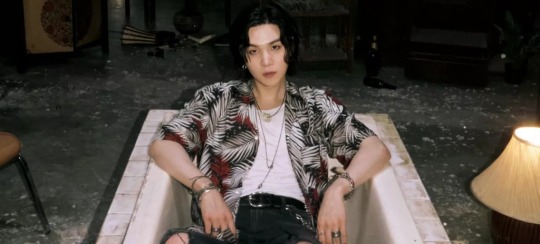
However you look at the current purgatory for K-pop superstars BTS — a long-expected pause for military service, a renewed focus on solo careers or an existential crisis for the genre — there are significant stakes not just for the group, but for the global music industry. While the seven members of the most successful act in South Korean history take turns, based on their respective birthdates, performing mandatory 18-month turns in the military — Jin and J-Hope are currently serving — those not yet conscripted have the chance to reestablish themselves as solo acts, after six chart-topping Billboard albums and six No. 1 Hot 100 singles. For the band’s label, Hybe, in the midst of a global acquisition spree, billions of dollars are potentially on the line. Bang Si-hyuk, Hybe chairman, recently stated that there is no set date for BTS’ comeback as a group, though he hopes they can return in 2025. Before beginning his military term later this year, group member Suga is touring U.S. arenas on the back of his solo debut album, “D-Day,” performed under the alias Agust D (he has two other mixtapes as Agust D). The dark, smoldering rap album debuted at No. 2 on the Billboard 200.
This week, Suga will perform three sold-out shows at Inglewood’s Kia Forum, on May 10, 11 and 14. However, he swears, he’s not competitive about it with his bandmates. “Are you competitive with your family members? Do you get jealous if your brother or your sister does well?” he asked with a laugh during a Zoom interview (Suga spoke through a Korean translator). “We’re real brothers, period. If I do well, that’s good. If my family members do well, that’s even better.”
Suga’s Agust D alias has long turned heads within the BTS solo-project sphere. Sometimes, those heads nearly get decapitated via giant ritual temple sword, as in his 2020 video for the rowdy “Daechwita.” Other times, they get stabbed right through with a pair of chopsticks, as Suga does himself in the deliciously grisly, “Oldboy”-worthy video for the new single “Haegeum.” It’s tough to square this genuinely transgressive solo artist with the snazzy-suited, fleet-footed heartthrob harmonizing on a Hot 100 hit like “Butter.” Devoted BTS Army fans know that Suga has an underground streak from his pre-BTS days, cribbing production notes from pioneering Korean rap acts like Epik High.
“Some bright and cheerful songs go into BTS,” he said. “But I’ve been doing music without any filter all the time, so I wouldn’t differentiate between Agust D or Suga, because all those are all me.” Still, “D-Day” is a standout, and not just for the sub-shaking production and gory videos. “Haegeum” is lacerating about modern life in South Korea: “Maybe we do it to ourselves/ Slaves to capitalism, slaves to money / Slaves to hatred and prejudice/ Slaves to YouTube, slaves to flexin’.” – Then he turns his blade on the internet culture that fascinates and destroys young people “Endless influx of information prohibits freedom of imagination / And seeks conformity of thought / All these painful noises blind you.”
“We’re living a life that’s better than ever before,” Suga said. “Some say we all live better lives than the king hundreds of years ago. But everything we worry about is coming too fast. Everyone’s lonely without having a sense of belonging, we can’t relate to the things that our parents have experienced, like being obsessed with accomplishments. Nobody feels a sense of belonging.”
Suga’s not immune from self-criticism, either. On “People Pt. 2,” with K-pop R&B singer IU, he sorts out his wariness around intimacy. “Selflessness can actually be selfish too, it’s true / It’s actually my greed when I say that it’s all for you.” – “This thing called love … it’s conditional,” he sings. “Wasn’t loved enough as a kid, that’s why I’m the cautious type.” Suga, born Min Yoon-gi, famously broke down in tears after seeing his formerly reluctant parents attend a BTS show in 2016. What did they make of that song?
“I don’t actually let my parents listen to my music before it’s released because there’s so many swear words,” Suga answered with a laugh. “My parents only listen to BTS songs. Things are good with us.”
On one hand, being in a globally famous act means any slip-up could be perilous. On the other, BTS-size stardom and a reputation for real artistry allow for uncommon candor, said Sang Cho, co-founder of the L.A.-based K-pop distribution and event firm KAI Media. “Suga and RM are to BTS what Lennon and McCartney were to the Beatles. Every member is talented, but these two are definitely the driving force behind their music,” Cho said. “I think Suga is a bit more Lennon — more explicit in his anti-establishment sensibilities. ‘Haegeum’ is a double entendre of a traditional Korean string instrument and wordplay on ‘liberation from restrictions.’”
“D-Day” also reflects on the music that helped Suga become a serious artist. His track “Snooze” was one of the late Japanese composer Ryuichi Sakamoto’s last collaborations, an artful yet stern track that brought Suga back to his teenage days learning to sample. “I’m not really good at piano, but I remember playing ‘Merry Christmas Mr. Lawrence’ all day when I was young,” Suga said. “It’s impossible not to be influenced by him if you’re born in Korea. When I was young, I needed instrumentals without voice to sample, so I reversed and chopped his music. I am very grateful I can call him a mentor even though I only met him once.”
While Suga is playfully cynical about accolades like Grammy Awards — “Isn’t that a local thing?” he joked, echoing South Korean director Bong Joon-ho’s quip about the Oscars — he has nuanced thoughts about his place in hip-hop. “I did have that differentiation when I was younger. I hoped that [rap fans] would approve of my music,” he said. “But I have this very firm belief that if I go to a hip-hop concert, where there’ll be only hip-hop fans, well, BTS fans are hip-hop fans too. I’m a huge fan of hip-hop, but what’s important here is that it’s not empty words to do music for the people that have sent you love and support.” – As the members of BTS sort out these years in transition, they’re still in one another’s lives. BTS’ Jimin debuted atop the Hot 100 with “Like Crazy” in March. Suga can’t wait to be in the crowd cheering for his bandmates when their times come.
“If you live for 13 years in one house under the same roof 24/7, you become a family,” Suga said. “A lot of people think that the relationships between K-pop band members are kind of fake, but that’s not true. For me, it’s more like, ‘Oh, Jimin, hi! You made it to the Hot 100, I’m so proud of you!’”
© LATimes
#ultkpopnetwork#mgroupsedit#idolsincedits#maleidolsedit#yoongi#suga#min yoongi#bangtan#bts#i/n.article news#i. interviews#latimes.mag
31 notes
·
View notes
Text
SUGA (슈가)
Real name: 민윤기 (Min Yoongi)
Birth date: 09 March 1993
Home city: Daegu
Former stage name: Gloss (....-2013)
Studio name: Genius Lab
Instagram account
BU character: Min YoonGi
BT21 character: Shooky

Biography
SUGA started as an underground rapper and producer in Daegu. In 2013, he came to Seoul and got into Big Hit where he debuted. At first not really interested in being an idol, he still worked hard to become one while still keeping an hand in the composition and production of BTS songs. Acknowledged by his peers, he collaborated on a lot of artists’ songs be it as a rapper or as a producer
For a more complete biography, you can check these ressources:
biography from the volume 2 of the Japan Official Fanclub magazine (trans by kocchi, Kimmy Yang, ktaebwi)
compilation of biographical info from different interviews
pre-debut History
DJ Booth’s article about his philosophy
SUGA has also shared tidbits of his daily life:
[VLOG] Fishing for time... (2019)
목공방 VLOG (woodworking shop) (2022) (Instagram post)
Birthday albums: 2014, 2015, 2016, 2017, 2018, 2019, 2020, 2021, 2022, 2023, 2024
Recommendations
Music
Spotify playlist
You can find Youtube playlists of the songs he shared on Spotify and on Twitter or during interviews.
Books/Movies/Series/Anime
Google sheet of his recommendations
Solo activity
Music (discography)
“All I Do Is Win” (2013)
Rap Monster, Suga & 진 - “어른아이” (Childish Adult) (2013)
"Dream Money” (2013)
“싸이하누월 MIX Final” (INST) (2013)
Agust D (2016) (see this post)
Suran - “WINE (오늘 취하면) (Feat.Changmo) (창모) (Prod. SUGA)” (2017)
“So Far Away (SUGA, 진, 정국 Ver.)” (gift for the Festa, 2017)
RM, SUGA, j-hope - 땡 (Daeng) (for the Festa, 2018)
Epik High - “노땡큐 (No Thanxxx) ft. MINO, SIMON DOMINIC, THE QUIETT” (cameo at the end, 2018)
“Seesaw X I NEED U REMIX” (2018)
LeeSoRa - “Song Request (Feat. SUGA of BTS)” (2019)
D-2 (2019) (see this post)
헤이즈 (Heize) - “We don't talk together (Feat. 기리보이 (Giriboy)) (Prod. SUGA)” (2019)
Halsey - “SUGA's Interlude” (2019)
IU(아이유) - “eight(에잇) (Prod.&Feat. SUGA of BTS)” (2020)
MAX - “Blueberry Eyes (feat. SUGA of BTS)” (2020)
Over The Horizon By SUGA Of BTS (for Samsung, 2021)
ØMI - “You (Prod. SUGA of BTS)” (2021)
Juice WRLD - “Girl Of My Dreams (with Suga from BTS)“ (2021)
Jung Kook (정국) - ”Stay Alive (Prod. SUGA of BTS)” (OST for the 7FATES: CHAKHO webcomic, 2022)
PSY - “That That (prod. & feat. SUGA of BTS)” (2022)
--- Chapter 2 ---
Over the Horizon 2022 by SUGA of BTS (for Samsung, 2022)
D-DAY (2023) (see this post)
Halsey - “Lilith (Diablo IV Anthem)” feat. SUGA (2023)
For more details about the songs that don’t have their own post, I listed all the info I had here. For Chapter 2 songs, please check here.
Shows
꿀 FM 06.13 (Kkul FM) (2014, anchor)
he’s the official DJ for all BTS radio shows. During the spring of 2020, he did 9 episodes of DJ’s SUGA Honey FM 06.13 on Vlive (now on Weverse): first episode, with RM, with Jin, with V, with j-hope, with Jimin, with Jung Kook, with BTS
화개장터 (Hwagae Market) (2015, anchor)
pre-open
episode 0 [ 대국민사과방송 ] (national apology broadcast)
episode 1 [ 요지부동 ] (try to not react)
episode 1.5 [ 벌칙수행 ] (penalty execution)
SOPE 👨❤️👨필리핀에 오다! (Came to the Philippines!)
솝 꿀피부를 부탁해😆 (Please take care of my honey-soft skin)
해체 발표 (disbandment announcement) for April Fools
슈취타 (Suchwita) (2022, anchor)
Youtube playlist
The title of the show is in reference to his song ��Daechwita”
The goal of the show is to have honest discussions with a guest while drinking alcohol
SUGA’s Instagram posts: #1, #2, #3, #4, #5
Weverse Magazine: “K-pop musicians are changing the talk show format”
Brands endorsement
Global ambassador for Valentino (2023): official tweets, SUGA’s Instagram post, #2
Ambassador for the NBA (2023): tweet announcement, official tweets, announcement on the NBA website
Magazines
Marie Claire Korea May issue (2023): teaser tweet, tweets, Youtube videos, interview, SUGA’s Instagram post #1, #2, #3
VOGUE JAPAN August issue (2023): tweets, interview
GQ Korea October issue (2023)
Interviews
BE comeback interview: “I'm grateful that there are still unvisited areas in the world of music”
Butter release interview: “This is the only thing I know how to really do”
Proof release interview: “I hope they’re excited for everything so I can give their life meaning each and every day”
Trivia
SUGA used to play a BTS fansite named 슈가의 시선 (SUGA’s sight). You can still find some of his tweets here, here and here, notably the “Photograph by SUGA” series, as well as blog posts:
Spring
Work
Members
Incheon International Airport and Thailand (those 2 were shot during the first NOW photobook filming)
“Just One Day”
BTS 1st anniversary.
He loves and used to play basketball. The two intros he made for the 화양연화 series, “Intro: 화양연화“ and “Intro: Never Mind”, have elements reminding of the game, be it in the beat, the lyrics or the video. While in the United States, he took the occasion to visit several teams.
He forms the group Sope with j-hope. As this subunit, they made the show 화개장터 (Hwagae market) and the Japanese song “Otsukare”.
10 notes
·
View notes
Text
[✎ ITA] Los Angeles Times, intervista SUGA : ‘Siamo veri fratelli, punto’ | 09.05.23⠸

SUGA | Agust D 💿 D-DAY : Intervista con il Los Angeles Times
SUGA dei BTS ci parla dell'avventura solista, del suo amore per l'hip-hop e del futuro del gruppo:
‘Siamo veri fratelli, punto’
__ di AUGUST BROWN | 9 maggio 2023 | Twitter
Comunque prendiate l'attuale limbo delle superstar del K-pop, i BTS — una lunga pausa prevista per poter adempiere al servizio militare, un rinnovato focus sulle proprie carriere soliste o una vera e propria crisi esistenziale per la scena K-pop — questa comporta comunque alcune importanti sfide, non solo per la band ma anche per l'industria musicale globale.
Mentre i membri del gruppo più famoso nella storia musicale della Corea del Sud fanno a turno, in ordine di compleanno, per adempiere ai 18 mesi di servizio militare obbligatorio — Jin e J-Hope hanno già iniziato — i ragazzi che non si sono ancora arruolati hanno l'opportunità di ricostruirsi un nome come artisti solisti, dopo sei album di successo sulle classifiche Billboard ed altrettanti singoli alla posizione n.1 della Hot 100, ottenuti dal gruppo.
La loro etichetta, la Hybe – attualmente impegnata in un'ondata di acquisizioni – rischia potenzialmente di perdere miliardi di dollari. Recentemente, Bang Si-Hyuk, il presidente della Hybe, ha dichiarato che non c'è ancora una data precisa per un ritorno di gruppo, nonostante riponga le sue speranze sul 2025.
Prima di dare inizio al suo servizio militare – più tardi, nel corso di quest'anno – Suga sta facendo un tour delle arene americane, in seguito al rilascio del suo album di debutto solista, “D-Day”, pubblicato a nome Agust D (ha anche altre due mixtape firmate Agust D). Questo ardente e cupo progetto rap ha debuttato alla pos. n.2 della Billboard 200.
Questa settimana, Suga si esibirà in tre concerti sold out al Kia Forum di Inglewood, il 10, 11 e 14 maggio. Tuttavia, giura di non essere in competizione con i suoi compagni di gruppo.
“Lei si sente in competizione con i membri della sua famiglia? È geloso del successo dei suoi fratelli o sorelle?”, mi ha chiesto, ridendo, durante la nostra chiamata Zoom (Suga era coadiuvato da un interprete). “Siamo veri e propri fratelli, punto. Se io ho successo, bene. Se è la mia famiglia ad avere successo, ancor meglio.”
È ormai tanto che l'alter ego di Suga, Agust D, fa girar teste nella sfera dei progetti solisti dei BTS. Talvolta, alcune di quelle teste rischiano pure d'esser mozzate da un'enorme spada rituale, come nel video musicale della sua sontuosa “Daechwita”, del 2020. Altre, vengono infilzate da parte a parte con un paio di bacchette, come lo stesso Suga si premura di fare nel deliziosamente macabro video – in stile “Oldboy” - girato per il suo nuovo singolo, “Haegeum”.
youtube
Risulta difficile conciliare questo trasgressivo artista solista con l'agile ed elegante rubacuori che armonizza su successi da Hot 100 come “Butter”. Le/gli ARMY più devoti sanno che Suga ha una vena underground risalente agli anni precedenti al debutto nei BTS, quando già prendeva spunti di produzione da alcuni pionieri del rap coreano, quali gli Epik High.
“I BTS hanno parecchie canzoni ottimiste e vivaci”, spiega. “Ma la mia musica, da sempre, è priva di ogni filtro. Ecco perché non mi piace separare Agust D da Suga, perché dietro entrambe queste figure ci sono comunque io.”
Ciononostante, c'è da dire che “D-Day” riesce comunque a distinguersi, e non solo per la produzione da brivido e la crudezza dei suoi video. In “Haegeum”, l'artista è lapidario riguardo la vita moderna in Corea del Sud: “Forse è tutta opera nostra/ Schiavə del capitalismo, schiavə del denaro/ Schiavə dell'odio, del pregiudizio / Schiavə di YouTube, schiavə del vanto”. Poi punta la sua lama contro la cultura Internet, che così tanto affascina e distrugge i giovani: “Un flusso di informazioni incessante impedisce la libertà di immaginazione/ e cerca di creare conformismo/ Tutti questi rumori frastornanti ci assordano, accecano”.
“La nostre vite sono meglio di quanto non siano mai state in passato”, dice Suga. “Secondo alcunə, viviamo meglio dei re vissuti centinaia di anni fa. Ma le nostre preoccupazioni si avverano anche più facilmente. Ognunə di noi è solə, si sente fuori posto e le esperienze ed i valori dei nostri genitori ci sembrano ormai estranei, come, ad esempio, la fissazione per il successo ed i risultati. Non proviamo più alcun senso di appartenenza.”
Ma Suga, a sua volta, non si sottrae all'auto-critica. In “People Pt. 2”, traccia in collaborazione con l'artista R&B / k-pop IU, cerca di venire a patti con la sua diffidenza rispetto all'intimità. “Già, l'abnegazione può, di fatto, sfociare nell'egoismo, è vero/ Quando dico che tutto ciò che faccio è per te, in realtà è la mia brama a parlare”.
“Questa parola, ‘amore’ …è condizionale”, canta. “Un bambino che non ha ricevuto abbastanza amore, ecco perché sono un tipo, prima di tutto, prudente”.
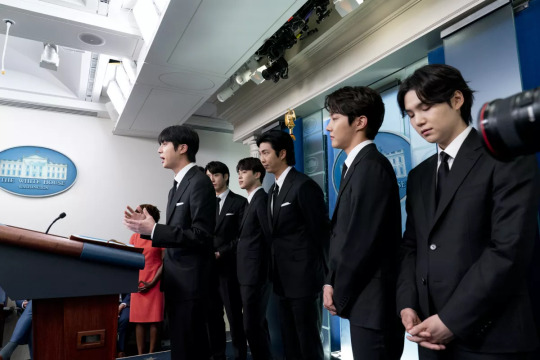
Suga – nome di nascita Min Yoongi – è noto per essere scoppiato in lacrime dopo aver visto i suoi genitori, inizialmente riluttanti [rispetto alla sua carriera musicale], tra il pubblico di un concerto dei BTS, nel 2016. Che idea si sono fatti di questo brano?
“In realtà, non faccio ascoltare la mia musica ai miei genitori prima del rilascio, perché ci sono troppe imprecazioni”, risponde ridendo. “I miei genitori ascoltano le canzoni dei BTS. Andiamo d'accordo, ora.”
Da un lato, essere parte di un gruppo famoso in tutto il mondo significa che ogni passo falso può essere pericoloso. Dall'altro, una fama come quella dei BTS – nonché la loro ottima reputazione artistica – dà un certo margine di candore e schiettezza, che non è da tutti, ci ha spiegato Sang Cho, co-fondatore della ditta di distribuzione ed eventi K-pop KAI Media, con sede a L.A. “Suga e RM sono come i Lennon e McCartney dei BTS. [È probabile RM sarà il prossimo membro ad arruolarsi]. Tutti i membri sono molto talentuosi, ma loro due sono decisamente la forza motrice dietro la musica dei BTS ”, ha detto Cho. “Credo Suga sia un po' più il Lennon della situazione — più esplicito nella sua sensibilità anti-establishment. ‘Haegeum’ è un doppio senso che fa riferimento sia ad uno strumento a corde appartenente alla tradizione coreana, che un gioco di parole che significa ‘libertà dalle restrizioni’.”
“D-Day”, inoltre, è una riflessione sulla musica che ha aiutato Suga a diventare un artista vero e proprio. “Snooze” è una delle ultime collaborazioni del compositore giapponese Ryuichi Sakamoto - un brano sapientemente costruito, seppur un po' austero, in cui Suga ripensa alla sua adolescenza e agli anni in cui ha imparato a lavorare sui sample.
“Non sono poi così bravo al pianoforte, ma ricordo ancora quando passavo le mie giornate a suonare ‘Merry Christmas Mr. Lawrence’, quando ero più giovane”, dice Suga. “È impossibile sfuggire alla sua influenza [di Sakamoto] quando si è nati in Corea. Quando ero adolescente, avevo bisogno di brani strumentali, privi di voce, come sample, quindi invertivo e editavo la sua musica. Sono molto grato di poterlo considerare un mio mentore, nonostante io l'abbia incontrato solo una volta.”
youtube
Nonostante Suga sia ironicamente cinico rispetto a riconoscimenti come i Grammy Awards — “Non è più una cosa locale?” scherza, facendo eco alla battuta del regista sud-coreano Bong Joon Ho riguardo gli Oscar —, ha un'idea piuttosto precisa della posizione che occupa nella scena hip-hop.
“Quando ero più giovane, ci tenevo a quella distinzione. Speravo nell'approvazione dei/lle fan della musica rap”, confida. “Ma sono sicuro che se andassi ad un concerto hip-hop, ci troverei solo fan di quel genere, mentre, beh, le/i fan dei BTS sono anche fan dell'hip-hop. Io stesso sono un grandissimo appassionato di hip-hop, ma la cosa più importante è che non è fiato sprecato fare musica per coloro che ti hanno sempre amato e supportato.”
Mentre i membri dei BTS sono alle prese con questi anni di transizione, sono ancora sempre molto presenti gli uni nella vita degli altri.
A marzo, “Like Crazy” di Jimin ha debuttato in vetta alla classifica Hot 100. Suga non vede l'ora di assistere ai concerti dei suoi compagni di gruppo, quando verrà il momento, facendo il tifo tra il pubblico.
“Quando vivi per 13 anni sotto lo stesso tetto, 24/7, non puoi che diventare una famiglia”, dice. “Molte persone credono che i legami tra i membri dei gruppi K-pop siano finti, ma non è vero. Per noi, ad esempio, la relazione è più tipo ‘Oh, Jimin, ciao! Sei entrato nella Hot 100, sono davvero fiero di te!’.”
⠸ ita : © Seoul_ItalyBTS⠸
#Seoul_ItalyBTS#TradITA#ITA#Traduzione#BTS#방탄소년단#SUGA#슈가#AgustD#Intervista#Articolo#LosAngelesTimes#D-DAY#090523#Youtube
4 notes
·
View notes
Link
0 notes
Text
050923 LA Times
BTS’ SUGA on going solo, his love of hip-hop and the band’s future: ‘We’re real brothers, period’

However you look at the current purgatory for K-pop superstars BTS — a long-expected pause for military service, a renewed focus on solo careers or an existential crisis for the genre — there are significant stakes not just for the group, but for the global music industry.
While the seven members of the most successful act in South Korean history take turns, based on their respective birthdates, performing mandatory 18-month stints in the military — Jin and j-hope are currently serving — those not yet conscripted have the chance to reestablish themselves as solo acts, after six chart-topping Billboard albums and six No. 1 Hot 100 singles.
For the band’s label, Hybe, in the midst of a global acquisition spree, billions of dollars are potentially on the line. Bang Si-hyuk, Hybe chairman, recently stated that there is no set date for BTS’ comeback as a group, though he hopes they can return in 2025.
Before beginning his military term later this year, group member SUGA is touring U.S. arenas on the back of his solo debut album, “D-Day,” performed under the alias Agust D (he has two other mixtapes as Agust D). The dark, smoldering rap album debuted at No. 2 on the Billboard 200.
This week, SUGA will perform three sold-out shows at Inglewood’s Kia Forum, on May 10, 11 and 14. However, he swears, he’s not competitive about it with his bandmates.
“Are you competitive with your family members? Do you get jealous if your brother or your sister does well?” he asked with a laugh during a Zoom interview (SUGA spoke through a Korean translator). “We’re real brothers, period. If I do well, that’s good. If my family members do well, that’s even better.”
SUGA’s Agust D alias has long turned heads within the BTS solo-project sphere. Sometimes, those heads nearly get decapitated via giant ritual temple sword, as in his 2020 video for the rowdy “Daechwita.” Other times, they get stabbed right through with a pair of chopsticks, as Suga does himself in the deliciously grisly, “Oldboy”-worthy video for the new single “Haegeum.”
It’s tough to square this genuinely transgressive solo artist with the snazzy-suited, fleet-footed heartthrob harmonizing on a Hot 100 hit like “Butter.” Devoted BTS ARMY fans know that SUGA has an underground streak from his pre-BTS days, cribbing production notes from pioneering Korean rap acts like Epik High.
“Some bright and cheerful songs go into BTS,” he said. “But I’ve been doing music without any filter all the time, so I wouldn’t differentiate between Agust D or SUGA, because all those are all me.”
Still, “D-Day” is a standout, and not just for the sub-shaking production and gory videos. “Haegeum” is lacerating about modern life in South Korea: “Maybe we do it to ourselves/ Slaves to capitalism, slaves to money/ Slaves to hatred and prejudice/ Slaves to YouTube, slaves to flexin’.”
Then he turns his blade on the internet culture that fascinates and destroys young people (including other K-pop artists, like the late Moonbin): “Endless influx of information prohibits freedom of imagination/ And seeks conformity of thought/ All these painful noises blind you.”
“We’re living a life that’s better than ever before,” SUGA said. “Some say we all live better lives than the king hundreds of years ago. But everything we worry about is coming too fast. Everyone’s lonely without having a sense of belonging, we can’t relate to the things that our parents have experienced, like being obsessed with accomplishments. Nobody feels a sense of belonging.”
SUGA’s not immune from self-criticism, either. On “People Pt. 2,” with K-pop R&B singer IU, he sorts out his wariness around intimacy. “Selflessness can actually be selfish too, it’s true/ It’s actually my greed when I say that it’s all for you.”
“This thing called love … it’s conditional,” he sings. “Wasn’t loved enough as a kid, that’s why I’m the cautious type.”

SUGA, born Min Yoon-gi, famously broke down in tears after seeing his formerly reluctant parents attend a BTS show in 2016. What did they make of that song?
“I don’t actually let my parents listen to my music before it’s released because there’s so many swear words,” SUGA answered with a laugh. “My parents listen to BTS songs. Things are good with us.”
On one hand, being in a globally famous act means any slip-up could be perilous. On the other, BTS-size stardom and a reputation for real artistry allow for uncommon candor, said Sang Cho, co-founder of the L.A.-based K-pop distribution and event firm KAI Media.
“SUGA and RM are to BTS what Lennon and McCartney were to the Beatles. [RM is expected to be the next BTS member to enlist.] Every member is talented, but these two are definitely the driving force behind their music,” Cho said. “I think SUGA is a bit more Lennon — more explicit in his antiestablishment sensibilities. ‘Haegeum’ is a double entendre of a traditional Korean string instrument and wordplay on ‘liberation from restrictions.’”
“D-Day” also reflects on the music that helped SUGA become a serious artist. His track “Snooze” was one of the late Japanese composer Ryuichi Sakamoto’s last collaborations, an artful yet stern track that brought SUGA back to his teenage days learning to sample.
“I’m not really good at piano, but I remember playing ‘Merry Christmas Mr. Lawrence’ all day when I was young,” SUGA said. “It’s impossible not to be influenced by him if you’re born in Korea. When I was young, I needed instrumentals without voice to sample, so I reversed and chopped his music. I am very grateful I can call him a mentor even though I only met him once.”
While SUGA is playfully cynical about accolades like Grammy Awards — “Isn’t that a local thing?” he joked, echoing South Korean director Bong Joon Ho’s quip about the Oscars — he has nuanced thoughts about his place in hip-hop.
“I did have that differentiation when I was younger. I hoped that [rap fans] would approve of my music,” he said. “But I have this very firm belief that if I go to a hip-hop concert, where there’ll be only hip-hop fans, well, BTS fans are hip-hop fans too. I’m a huge fan of hip-hop, but what’s important here is that it’s not empty words to do music for the people that have sent you love and support.”
As the members of BTS sort out these years in transition, they’re still in one another’s lives. BTS’ Jimin debuted atop the Hot 100 with “Like Crazy” in March. Suga can’t wait to be in the crowd cheering for his bandmates when their times come.
“If you live for 13 years in one house under the same roof 24/7, you become a family,” SUGA said. “A lot of people think that the relationships between K-pop band members are kind of fake, but that’s not true. For me, it’s more like, ‘Oh, Jimin, hi! You made it to the Hot 100, I’m so proud of you!’”
Source: LA Times
1 note
·
View note
Video
youtube
[FREE] Loso Dark Violin UK Drill Type Beat 2023-GLOBAL (Prod. by Soundz Of Da Forest) 140 bpm C min 💰 Purchase this beat | Instant Delivery: https://bsta.rs/06892d72e 💳 Buy 2 Get 1 FREE: https://soundzofdaforest.beatstars.com 🥶 🥶 🥶 Subscribe 4 more cold beats: https://linktr.ee/SoundzOfDaForest 🥁 Drill Drum Kit - Soundz Of Da Forest - Drill High Kit - https://soundzofdaforest.beatstars.com/sound-kits 📸 Instagram: https://www.instagram.com/SoundzOfDaForest 📑 Facebook https://www.facebook.com/SoundzOfDaForest 🎧 Soundcloud https://soundcloud.com/soundzofdaforest ✉ Mail [email protected] 🐦 Twitter https://twitter.com/spurloz 🎶 Distrokid https://distrokid.com/hyperfollow/soundzofdaforest/beatz-fo-underground 💲 PayPal https://www.paypal.com/paypalme/soundzofdaforest • DON'T USE CONTENT ID on your song unless you purchased exclusive rights, otherwise it will be hit with a complaint. • NOTE: This beat is only free for non-profit use. For profit use, you must purchase the beat at https://soundzofdaforest.beatstars.com/ You must credit me with (Prod. by Soundz Of Da Forest) #DarkViolinDrillBeat #ViolinDrillBeat #DrillBeats #DrillBeat #DarkDrillBeat #DrillTypeBeats #DrillTypeBeat #DarkDrillBeats #DarkDrill #UKDrill #UKDrillBeats #UKDrillBeat #UKDrillTypeBeat #UKDrillTypeBeat2022 #DrillBeats2023 dark drill beat 2023 dark drill beat free 2023 dark hard drill beat hard dark drill type beat hard drill type beat drill type beat drill type beats drill type beat 2023 drill beat 2022 drill beat free free drill type beat 2023 drill beat 2023 drill type beat dark hard drill type beat 2023 drill beat 2023 hard free drill beat 2023 drill beat hard dark drill beat dark drill type beat dark drill type beat free dark drill free drill type beat hard drill beat UK Drill Type Beat x NY Drill Type Beat UK Drill Instrumental 2023 Drill Type Beat 2022 Uk Drill Type Beat 2022 Type Beat 2022 Trap Beat 2022 Uk Drill Instrumental Drill Beat Drill Beat Instrumental Fredo Santana Type Beat Type Beat Type Beat 2021 Drill Trap Beat Drill Trap Instrumental Uk Drill Type Beat Hard Beat Instrumental Drill Beats 2021 Chicago Drill Type Beat Drill Beats Instrumentals Uk Drill Music Drill Music 2021 New York Drill Beat NY Drill Beat Instrumental NY Drill Type Beat Pop Smoke Type Beat Pop Smoke Type Beat 2021 Drill Beat 2021 M1 Type Beat Top1 Type Beat Ny Drill Type Beat 2021 Trapx10 Type Beat Teeway Type Beat Gully Type Beat Bandokay Type Beat Zone 2 Type Beat Block 6 Type Beat Young a6 Type Beat m24 Type Beat RV Type Beat Yanko Type Beat Trizzac Type Beat Yanko Type Beat 2021 V9 Type Beat V9 Type Beat 2021 Kwengface Type Beat 2021 Kwengface Type Beat Central Cee Type Beat Central Cee Type Beat 2021 Central Cee Type Beat 2021 Fumez The Engineer Plugged In W/Fumez The Engineer Plugged In Russ Millions Type Beat Russ Millions Type Beat 2021 Russ Millions Type Beat 2022 Tion Wayne Type Beat Tion Wayne Type Beat 2021 Tion Wayne Type Beat 2022 RV Type Beat OFB Type Beat Bandokay Type Beat Double LZ Type Beat RV Type Beat 2022 OFB Type Beat 2022 Bandokay Type Beat 2022 Double LZ Type Beat 2022 Dutchavelli Type Beat Dutchavelli Type Beat 2021 Dutchavelli Type Beat 2022 Dutchavelli Only If You Knew Dutchavelli Circle The Endz Tion Wayne Type beat 2022 Tion Wayne Wow Russ Millions Big Shark Russ Millions Big Shark type beat Russ Millions Big Shark type beat 2022 Russ Millions Big Shark beat Bandokay Slide type beat Bandokay Slide 2Smokeyy type beat 2022 2Smokeyy type beat #Drilltypebeat #Drilltypebeatfree #Drillinstrumental Tags ignore: uk drill,uk drill type beat,uk drill beat,drill beat,drill instrumental,uk drill instrumental,abra cadabra type beat,dutchavelli type beat,headie one type beat,headie one type beat free,abra cadabra type beat free,dutchavelli type beat free,central cee type beat,pop smoke type beat free,abracadabra type beat 2020,meekz type beat,drake x headie one type beat,ofb akz type beat,ofb type beat,abra type beat,abra cadabra drill type beat,ofb type beat 2020,headie one type beat 2020,m1llionz type beat,melodic drill type beat,loski type beat,tion wayne type beat,free headie one type beat,m1llionz type beat 2020,frosty type beat,drill type beat,uk drill type beat 2020,millionz type beat,uk drill instrumental 2020,headie one instrumental,drill type beat 2020,free drill beat,free uk drill beat,bandokay type beat,Double Lz type beat,OFB type beat,ofb instrumental,UK Drill Instrumental 2020,UK Drill Instrumental free,frosty super trapper,frosty super trapper type beat,yanko type beat,tugz type beat,kwengface type beat,uk rap beat,unknown t type beat,mad about bars,uk drill freestyle beat,r&b drill,OFB,Bandokay x double lz type beat,homerton,KO type beat,zone 2 instrumental,country dons type beat,sd muni type beat,m24 type beat,poundz type beat,russ millions uk drill type beat,PS type beat,AM type beat,skengdo type beat,410 type beat,nitonb type beat,RV type beat,fizzler type beat,pop smoke type beat,v9 type beat,uk drill type beat free,digdat instrumental,ko type beat
#youtube#DarkViolinDrillBeat ViolinDrillBeat DrillBeats DrillBeat DarkDrillBeat DrillTypeBeats DrillTypeBeat DarkDrillBeats DarkDrill UKDrill UKDr
0 notes
Text
ALOK AND SOLARDO COLLABORATE TO RELEASE NEW HIGH-ENERGY CLUB TRACK “OVER AGAIN”

Brazilian music superstar and philanthropist Alok, known globally for chart-topping collaborations with John Legend, Jason Derulo, Tove Lo, Ellie Goulding, and many more, has joined forces with UK-based dance music duo Solardo to release their new club single, “Over Again.”
The high-energy dance track will undoubtedly get the dancefloor moving all Summer long and is available now on all DSPs and streaming services via SONY International HERE.
Listen in here: https://open.spotify.com/track/00U3nGjoxrqX04GvjiypUz?si=236d5d34ef0549c2
“Over Again” is an electrifying fusion of Alok's signature sound and Solardo's tech-house style, resulting in a unique and unforgettable dancefloor experience. The song is extremely captivating with its catchy vocal hook and infectious beat that is sure to get audiences moving. It showcases the exceptional production skills of both Alok and Solardo, with its intricate layers, complex rhythms, and atmospheric sound design. The track has a timeless feel to it, and it will definitely be a favorite among club-goers and electronic music fans alike.
“Working with Solardo on “Over Again” has been a great experience. I feel we really blended our sounds together nicely and I can’t wait for everyone to hear it!” - ALOK
“Over Again” is Brazilian superstar Alok’s second single of 2023, following January’s groovy disco-inspired single, “Work With My Love,” with English singer/songwriter James Arthur. 2022 ended with a slew of releases to cap a highly successful year, which was highlighted by Alok being crowned No. 1 DJ in Latin America and No. 4 in the world by DJ Mag and the launch of his “The Future Is Ancestral” philanthropic event series. The remarkable inaugural event brought his climate change initiatives and partnership to the United Nations’ Global Compact. It helped kick off New York’s Climate Change Week with a series of panels and a historic, first-ever performance on the rooftop of the United Nations headquarters. Alok’s musical successes in 2022 were also unmatched, with “Deep Down” staying at #1 on Billboard’s Dance charts for weeks while his dance-pop anthem “All By Myself” with Ellie Goulding and Sigala flooded radio waves around the world. With a remarkable 70 million social media followers, the music producer and philanthropist continues to build on his legendary catalog, which already includes global hit singles like "Hear Me Now” and his chart-topping remix of MEDUZA’s “Piece of Your Heart,” for which he won “Best Remix” at the 2020 International Dance Music Awards.
The extremely versatile and creative duo from the UK, Solardo, complement Alok’s style well to bring listeners a truly unique audio-sensory experience on “Over Again.” The duo’s dedication and love for the club scene is palpable on the track with their recognizable elements of techno, house, and trance. From 2019's revision of Marshall Jefferson's timeless "Move Your Body" to their hit “XTC” with Eli Brown becoming one of the biggest tracks in Ibiza in its year of release, it's clear that Solardo can simply do no wrong. The UK duo has already been off to a strong start in 2023 with their most recent release “Big Talk,” which saw them hit the studio for a huge collaboration with English actor and DJ Idris Elba.
“When Alok approached us about working together we knew we had an amazing opportunity. He is a huge international artist who has reached millions of people with his music. We wanted this track to have an underground DNA in its beats and bass, and the vocals needed to connect with the masses.” - Solardo
0 notes
Text
Mr Brainwash to Launch Battersea Power Station Show

Mr Brainwash to Launch Battersea Power Station Show One of the world's most collectable and provocative contemporary artists, Mr Brainwash, flies from LA to London to launch his eagerly awaited, new exhibition at the restored Battersea Power Station on 25 April, opening to the public until 3 May.

The pop art phenomenon - AKA Thierry Guetta - will make a personal appearance at the launch of the Clarendon Fine Art show; one of his most audacious yet, appropriating and reinterpreting the classics and offering his signature, subversive and playful takes on the modern world. The high impact and high value new collection is rich in styles and themes, including pop culture sculptures like Life is Beautiful, which became his catchphrase after his legendary LA exhibition of the same name catapulted him to fame in 2008, making history as the most highly attended private exhibition of all time with more than 50,000 visitors and artwork selling for six figures. The show will unveil large-scale statement pieces, brick artwork celebrating his street art origins, painted balloon sculptures, neon mirror artworks, "vandalised" frames liberating art from canvases, and paper originals deconstructing popular culture. Mr Brainwash will also be releasing two exclusive, limited editions, Long Live the King and Power to the People. Long Live the King commemorates the coronation of King Charles III and is the partner piece to the Platinum Jubilee Queen of Hearts editions, which are already being collected for double their original price. Power to the People is Mr Brainwash's bold, new depiction of the show's Battersea Power Station location, emblazoned with his graffiti, a Life is Beautiful neon and with nods to Pink Floyd's iconic Animals album artwork and Banksy, who directed the Oscar-nominated Exit through the Gift Shop documentary, charting Mr Brainwash's meteoric rise to fame. Like the French street artist, Battersea Power Station is larger than life and has been regenerated for the modern age, a concept which is close to his heart. The artist has a special connection to the iconic building and unveiled a giant mural there in 2021 to celebrate the launch of the Battersea Power Station Underground, which was accompanied by a large-scale light show on the Power Station itself and the unveiling of a Life is Beautiful sculpture. The mural is now on display inside the Grade II* listed building. After the London exhibition, the show will go on tour to Clarendon Fine Art's Birmingham and then Bluewater, Kent Galleries, both of which will feature Mr Brainwash in attendance, followed by week-long, public exhibitions. Clarendon Fine Art has been Mr Brainwash's exclusive UK gallery representative since 2020 and their CEO, Helen Swaby says: "His work is an orchestrated collision of street and pop art, built around messages of hope, that has challenged cultural norms and made him a global street art phenomenon. "We are excited about bringing Mr Brainwash back to a place with so much significance to him for this innovative riot of themes, styles, statements, jokes, commentary and chaos." After starring in Banksy's 2010 documentary, Mr Brainwash said: "Banksy captured me becoming an artist. In the end, I became his biggest work of art." Since then, Mr Brainwash has designed album covers for Madonna, Rick Ross and Michael Jackson, collaborated with everybody from Mercedes-Benz, the Beckhams, First Lady Michelle Obama - for her Let Girls Learn organisation - and Pope Francis for his Scholas youth foundation. And he is changing the face of street art in the UK with his unique brand of positivity. For further information, exhibition attendance, interview requests or high-res images, please contact: Charli Morgan or Matt Glass / [email protected] / [email protected] 020 8355 7864 Read the full article
0 notes
Text
Glacer FM is sourcing only the best!
The public always makes the right choice when it comes to their entertainment. This pertains to where they feel loyalty with respect to quality of programs on the air, a friendly communication, as well as a convenient and easy to access platform.
Glacer FM is the #1 Global Internet Radio Station focusing on Unsigned and Independent Music in all genres. Founded in 2020 to be a playlist for the people, selected by the people, they are providing an unparalleled opportunity for independent and unsigned artists to shine. Most digital radio stations stick within a certain genre and exclusively work with established artists to leverage their following for higher ratings but Glacer FM takes that concept and flips it on its head to create a space where lesser-known artists with extraordinary talent can reach their audience and gain the exposure they need to grow their personal brand.
We have got four unique music channels that are genre specific and are always seeking to find songs that will be most appealing to every audience.
Glacer Mix plays a wide variety of music genres ranging from Alternative, Blues, Jazz, Classical, Dance, Raggae, House, Electronic and World music to the African and Traditional Music Genres. It showcases the best of independent and unsigned works from these music genres as well as interviews and shows related to different cultures around the world.
Glacer RCM is the #1 Rock, Country and Metal music channel. It showcases the best of independent and unsigned works from these three music genres as well as interviews and shows related to the pop culture.
Glacer Urban is the #1 Hip-hop, R&B and Rhythmic music channel. It showcases the best of independent and unsigned works from these three music genres as well as interviews and shows related to urban artists and culture.
GLACER FM’s indie channel (GLACER UNDERGROUND) is giving every artists a chance to get heard on the LIVE broadcast by our global audience.
Our shows are equally geared at providing maximum entertainment. Hosting some of the most compelling and engaging new content on all topics ranging from news, culture, education, politics, business, science, talk, religion, health and sports to music, comedy, entertainment and more, we’re proud to be home to some of the best independent creators who make incredible podcasts for our global audience. Our podcasts & shows are accessible on Demand 24/7 making it easy for listeners to access their favorite episodes anytime they want.
We are customer focused as we intend to build a long-term and reputation with our users or customers. We the offer the best quality of services and have so many features that are beneficial to all our users, from the artists to the podcasters and new brands who are looking to win the hearts of our audiences worldwide.
We have got the best presentations and tools for the advertisers.
Here are a few notable key features showcasing our competitive advantage
• A rapidly growing audience
• A professional technical department
• A professional content curation team
• A competitive and rewarding atmosphere for our content creators
By engaging an audience of music enthusiasts with diverse music coverage for the digital age we are keen to song requests from our listeners. Our content and programming selections are entirely based on listener request. Please, Contact Us with your thoughts, comments and ideas at [email protected]
0 notes
Text
30 (Technically 34) Albums We Loved That Happened To Come Out in 2020
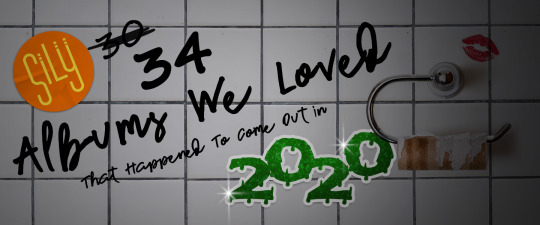
So much has already been said and written about this cursed past year, but a few good things came out of it, including the music. Album-wise, like many before it and many to come, it was an embarrassment of riches. But even with so much time on our hands to devour new tunes, it was often old favorites, songs of comfort or familiarity that garnered the heaviest rotation. For many artists, too, it was a year ripe for revisiting or reissues of old material, looking at existing songs with fresh and new perspectives. Simply put, with so much to listen to, new and old, the prospect of ranking a finite number of albums felt not only daunting, but frankly a bit stupid. Maybe we were late to the game, but 2020 taught us that music should and can be appreciated in multiple contexts, not limited to but including when it first came out and when it was heard again and again, even if years later. The records below--listed in alphabetical order--happened to be released in some form in 2020, whether never-before-heard or heard before but in a different format. And the only thing I know is that we’ll be listening to them in 2021 and beyond.
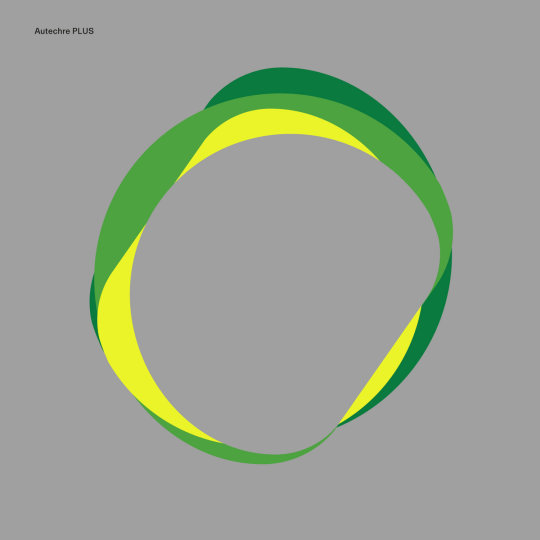
Autechre - SIGN & PLUS (Warp)
The legendary British electronic music duo surprise released SIGN a mere month and a half after its announcement and then PLUS 12 days later. The former was a beatific collection of soundscapes that belied the band’s usual harsh noise, while PLUS embraced that noise right back, drawing you in with the clattering chaotic burbles of opener “DekDre Scap B” and lurching forward. -Jordan Mainzer
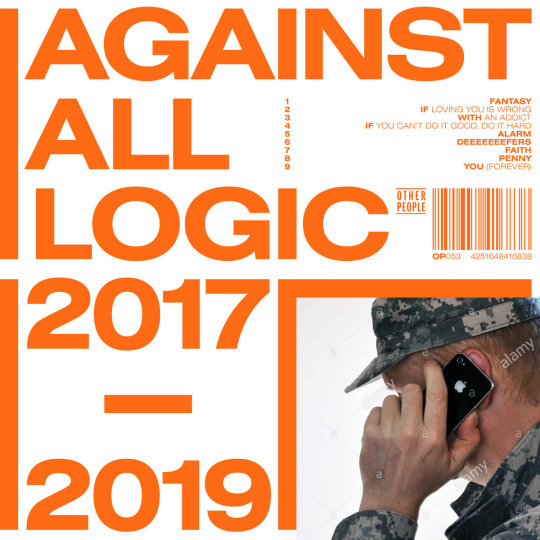
Against All Logic - 2017-2019 (Other People)
The perennially chill ambient house artist Nicolas Jaar had a busy 2020, as usual, releasing two albums under his name, Cenizas and Telas. But it was 2017-2019, the follow-up to the debut album from his Against All Logic moniker, that came first and throughout the year helped to illustrate Jaar’s penchant for combining inspired samples with club beats and tape hiss. Take the way the lovelorn vocals of “Fantasy” or soulful coos of “If Loving You Is Wrong” war skittering, scratchy percussion and cool arpeggios, respectively: Jaar is coming into his own as a masterful producer almost a decade after he released his first full-length. Oh, and bonus points for including none other than Lydia Lunch on a banger so blunt it would make Death Grips blush. - JM
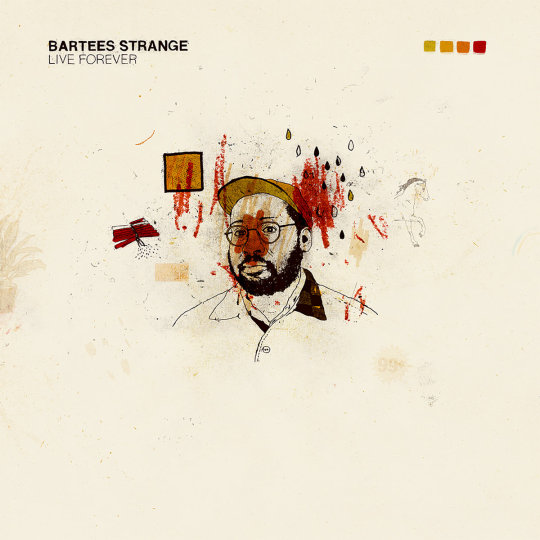
Bartees Strange - Live Forever (Memory Music)
Like many, my introduction to Bartees Strange was through Say Goodbye to Pretty Boy, his EP of The National covers. Creativity and shifting perspectives shine through each song’s reimaging, like flipping the coarse, almost manic “Mr. November” into something softer, more meditative. It felt like a mere peek into what was to come on Live Forever. Bartees Strange is a world-builder. Each track on his debut unfolds and welcomes you to a wildly engaging tableau, a fully constructed vision. “Jealousy” opens with soft vocals and birdsong. “In a Cab” is the slick soundtrack to racing through a cityscape in the rain, seeing the blurred lights of the high-rises above as you pass by. “Kelly Rowland” warps wistful pop song feelings. “Flagey God” takes you into a dark, pulsing club while only a few songs later, “Fallen For You” wraps you in echoed vocals and romantic, raw acoustic guitar.
It’s an accomplishment to craft an album of individual songs that stand strongly on their own but still feel cohesive. 2020 wasn’t all bad. It gave us Live Forever, a declaration of an artist’s arrival. - Lauren Lederman
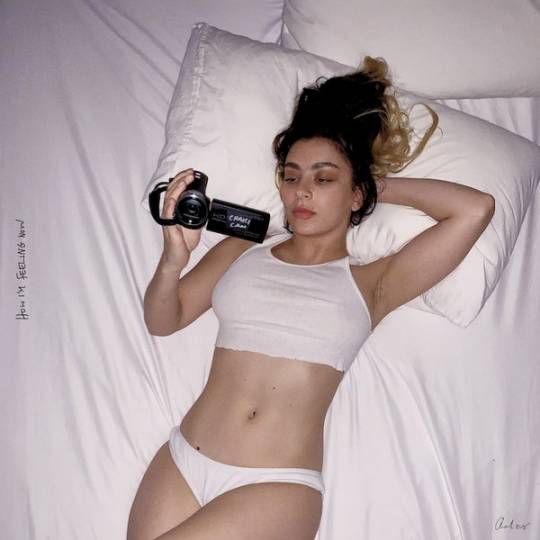
Charli XCX - how i’m feeling now (Atlantic)
Back in the spring, many of us wondered who would put out something great in 2020’s quarantine. It was hard to imagine that the intensity of a global pandemic would really allow for artists to embrace creativity. That thought carries the same eye-roll inducing feeling of “We’ll get some great punk music out of a Trump presidency,” but of course, Charli XCX delivered. Through live workshops with fans and longstanding collaborators, she delivered songs to dance alone to in your bubble. Charli embraces the unknown of the moment but clutches onto what’s familiar. Under the glitch-pop veneer of the album, she digs into the anxieties of not just this moment of time but of the bigger questions we all confront: trajectories of relationships with friends, romantic partners, ourselves. Album standouts “forever” and “i finally understand” embrace that feeling of both looking for control and accepting the lack of it. Charli is a master at balancing this. - LL
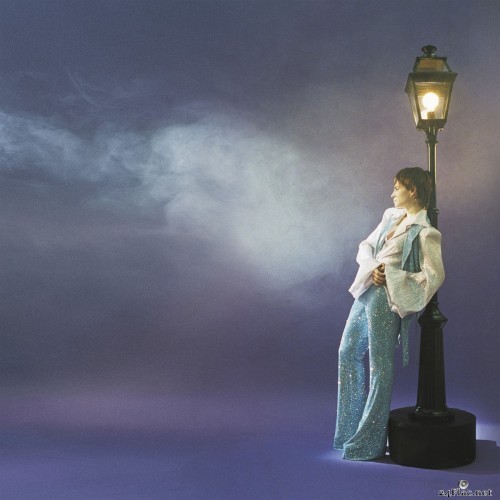
Christine and the Queens - La Vita Nuova (Because Music)
Named after a Latin text by Dante Alighieri about missing a woman who has died, Chris’ La Vita Nuova is not about mourning a death but instead about loneliness and isolation, post-relationship or otherwise. It doesn’t bang quite like her previous two albums, but it hits harder than ever.
Read our full review here.
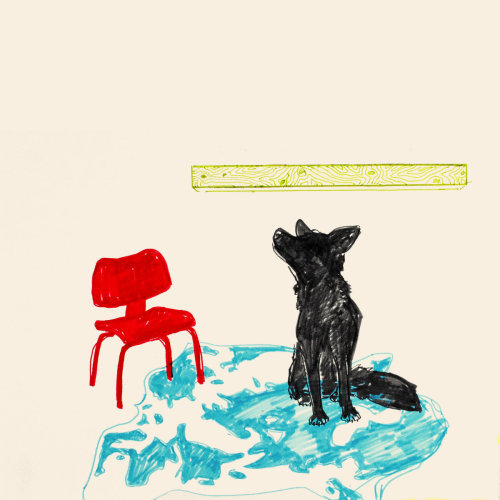
Dogleg - Melee (Triple Crown)
Released on March 13th, right as the COVID-19 pandemic hit, Melee was supposed to be supported by three cancelled tours–SXSW, an opening slot for Microwave, and an opening slot for Joyce Manor–and an appearance at this year’s cancelled Pitchfork Music Festival. Listening to the songs on the record, you can only imagine how they translate: the jerky momentum of “Bueno”, build-up of “Prom Hell”, gang vocals of “Fox”, clear-vocal anthem of “Wrist”, and odd groove of “Ender”.
Read “Buckle Up, Motherfucker”, our interview with Dogleg.
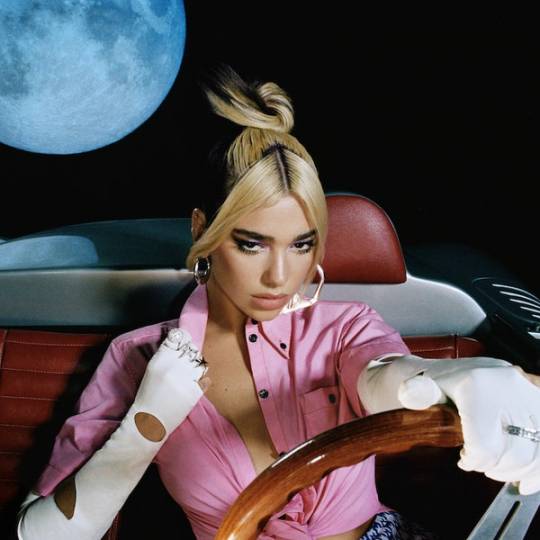
Dua Lipa - Future Nostalgia & Dua Lipa/The Blessed Madonna: Club Future Nostalgia (Warner)
Where Dua Lipa’s much-anticipated second album Future Nostalgia succeeded was in its disco anthems and retro, club-ready beats, so who better to bring out the best of the record than The Blessed Madonna? The turntablist masterfully curates a mix of heavy hitters of the charts and the underground that not only offers an essential complement to Future Nostalgia but transcends it. Sending the tracks out to various producers and singers for features and then adding her own samples on top, she invites you to peel back the layers, enter a YouTube rabbit hole of sample searching as much as bopping along.
Read our full review here.
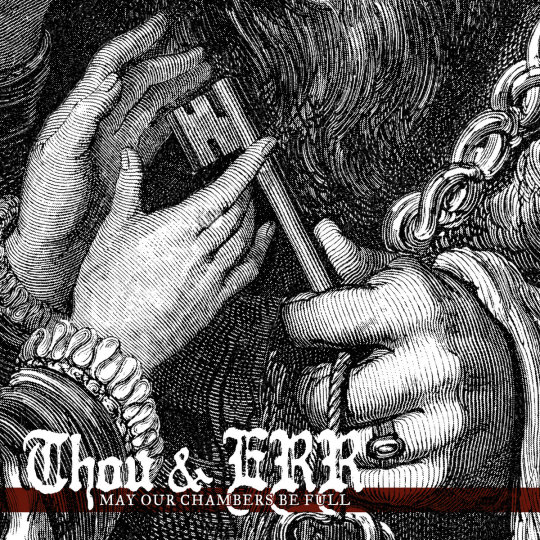
Emma Ruth Rundle & Thou - May Our Chambers Be Full (Sacred Bones)
Roadburn Festival has long been on my bucket list, and since the pandemic showed me how much live music can be taken away in a flash, when it’s safe again to travel and go to a festival, I may just pull the trigger and go--especially considering it’s the springboard for such fruitful and inspired collaborations as the one between Louisville singer-songwriter Emma Ruth Rundle and Baton Rouge sludge dwellers Thou. Rundle embraces the heavier opportunities on the follow-up to her incredible 2018 record On Dark Horses with the ever-flexible Thou backing her up vocally and instrumentally. Slow-burning opener “Killing Floor” offers a familiar introduction to fans of both--sort of what a Rundle/Thou song would sound like--before grunge chugger “Monolith” introduces huge, catchy riffs and “Out of Existence” a True Widow-esque dirge, newfound inspirations for both artists bringing the best out of each other. - JM
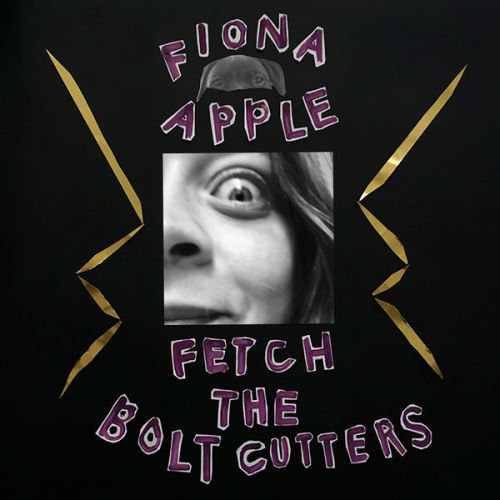
Fiona Apple - Fetch the Bolt Cutters (Epic)
What makes Fetch the Bolt Cutters stand out among Apple’s catalog and music in general is the clarity with which Apple seethes at those who have wronged her, whether ex-boyfriends or patriarchal oppressors, and looks to her relationships with other women for peace of mind.
Read our full review here.
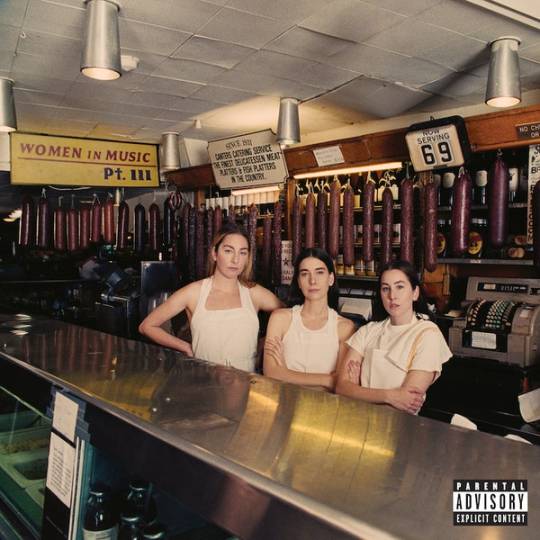
HAIM - Women in Music Pt. III (Columbia)
For HAIM, the title Women in Music Pt. III is suggestive that, more than their previous two records, their third centers around the experiences of being an all-female band in a historically white cis male-dominated scene, at least one that wouldn’t call catchy riffs written by a man “simple” or call attention to the faces a man makes while playing. What it doesn’t let on to is how deeply personal the record is, how, by unabashedly embracing genres and styles of music that they love, HAIM have made far and away their best album. Co-produced by the usual suspects, Danielle Haim, Ariel Rechtshaid, and ex-Vampire Weekender Rostam Batmanglij, it’s instrumentally and aesthetically dynamic and diverse, consistently earnest without devolving into cheese.
Read our full review here.
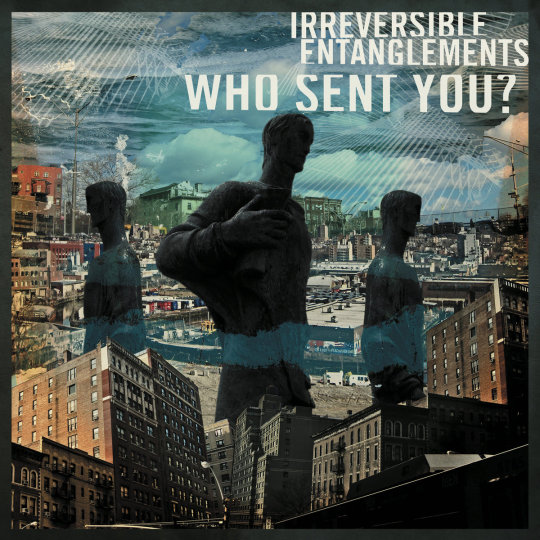
Irreversible Entanglements - Who Sent You? (International Anthem)
I’ve been captivated by Irreversible Entanglements ever since I first saw them at Pitchfork Music Festival 2018. The radical poetry of Camae Ayewa (aka Moor Mother) is the perfect front for a ramshackle mix of Luke Stewart’s spidery bass, Tcheser Holmes’ weighty drums, and a horn section that concocts tones that range from hopeful to desperate. At their best, Who Sent You? is a shining example of celebratory Afrofuturism and metaphysics that makes the urgency of Ayewa’s more concrete and political words all the more necessary. “No Más”, composed by Panamanian-born trumpeter Aquiles Navarro, is a declaration against imperialist oppression, while the stunning title track flips the switch like a Kara Walker painting, as Ayewa’s the one interrogating the police officer terrorizing her community. “Who sent you?” she repeats, never spiraling, grabbing a hold of the power and never letting go. - JM
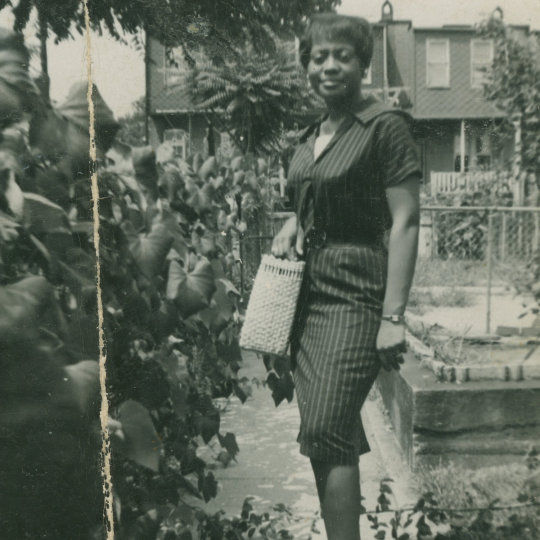
Jeff Parker - Suite for Max Brown (International Anthem/Nonesuch)
It’s Jeff Parker’s mom’s turn. After 2016′s The New Breed ended up being a tribute to the guitarist’s father, who passed away during the making of it, Parker decided to pay tribute to Maxine while she was still alive. Suite for Max Brown (Brown is his mother’s maiden name; Max is what people call her) is a genre-bending collection of tracks inspired by Parker’s DJing, juxtapositions of sequenced beats with improvisation that certainly sound like the brainchild of one individual. Indeed, Parker plays the majority of the instruments on it and engineered most of it at home or during his 2018 Headlands Center residency in Sausalito, CA; though all of the players and the vocalist (Jeff’s daughter Ruby Parker) on The New Breed show up, plus a couple trumpeters (piccolo player Rob Mazurek and Nate Walcott of Bright Eyes) and cellist Katinka Kleijn, Suite for Max Brown is a distinctly Jeff Parker record.
Read our preview of Jeff Parker & The New Breed’s set at Dorian’s last year.
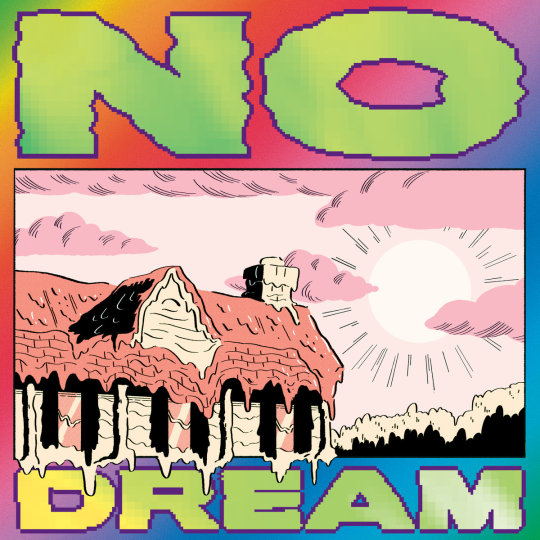
Jeff Rosenstock - NO DREAM (Polyvinyl)
Jeff Rosenstock throws us right into the spinning, manic energy of NO DREAM, his latest release from a seemingly endless well of music that never lacks urgency. It’s a reminder that though it’s been a strange year, the issues Rosenstock tackles here aren’t new. There’s no interest in making you feel comfortable here. On the album’s title track, Rosenstock sings, lulling you into a false sense of security, “They were separating families carelessly / Under the guise of protecting you and me.” But reality sets in, and the hazy guitars spin out as he spits, “It’s not a dream!” and, “Fuck violence!”
My image of Jeff Rosenstock in the year 2020 is masked up with “Black Lives Matter” scrawled across the fabric of his mask in Sharpie, performing album highlight “Scram!” on Late Night with Seth Meyers as high energy as ever. It felt like watching someone send out a beacon, both a distress signal and a call to arms. - LL
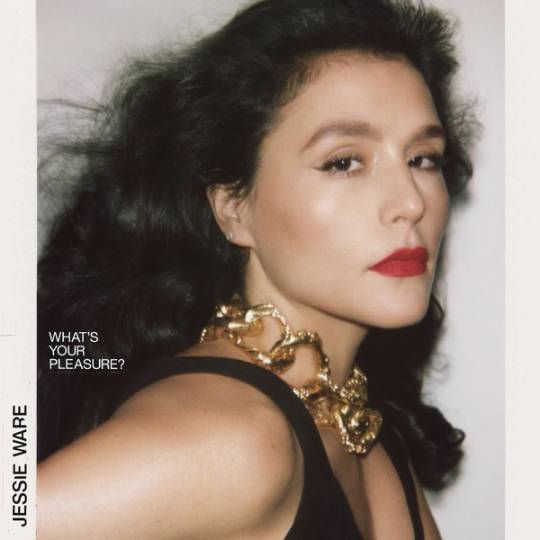
Jessie Ware - What’s Your Pleasure? (PMR/Friends Keep Secrets/Interscope)
I am not someone who goes to clubs. I don’t “go out dancing,” preferring to let loose in the privacy of my own home or a trusted friend’s house party. But Jessie Ware’s What’s Your Pleasure? makes me think I could embrace a night out like that, once the world opens up again, of course. The album is filled with syncopated disco beats that feel fresh and classic all at once. The abundant horns and strings on “Step Into My Life” are decadent, like light bouncing off sequins in a dark room. Ware’s voice is slinky and velvety one moment, windswept like her album cover the next. It’s songs like “Save a Kiss” that embrace both, allowing her to show off her range. - LL
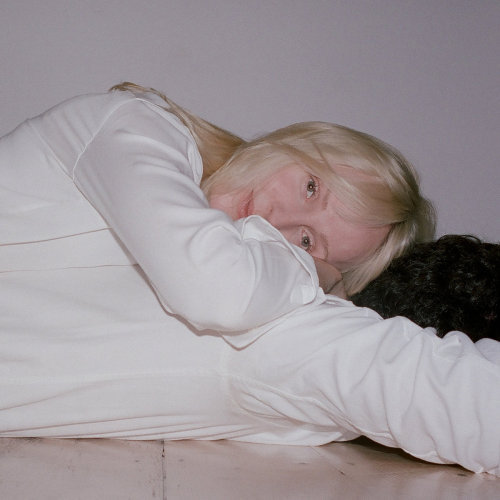
Laura Marling - Song for Our Daughter (Partisan)
With sparse production, mostly from her but with additions from Ethan Johns and Dom Monks, Marling foregoes the comparative maximalism of the Blake Mills-produced Semper Femina, her last proper full-length, and 2018′s LUMP collaboration. The songs aren’t simple, but they’re succinct, and every element, from Marling’s finger-picked guitars, the occasional slide guitar, and that unmistakably calm voice, sometimes alone and sometimes layered, fits. It’s her most universal set of songs yet, centering around the times when we’re apart from one another but reflecting on when we were together and when we might be together again, with no guarantees.
Read the rest of our review here.
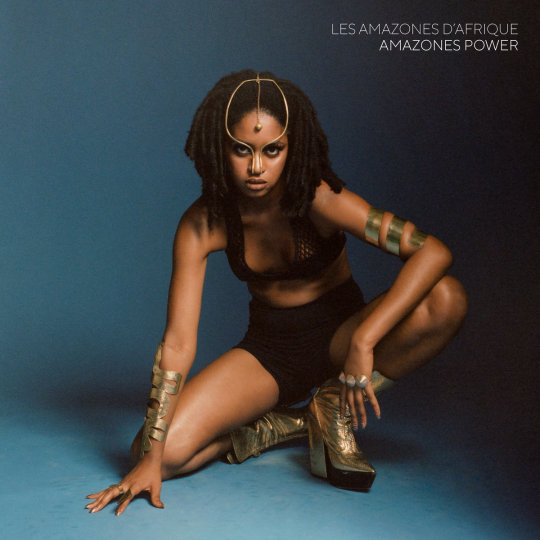
Les Amazones d’Afrique - Amazones Power (Real World Records)
The groovy pan-African collective expands upon their debut Republique Amazone and then some with Amazones Power, a tour-de-force statement of female empowerment in the face of oppression against women throughout the African diaspora. Indeed, the album is more than just songs boldly decrying FGM, though those demands ring heavily. Instead, the group goes further, delving into gender power structures in marriage on “Queens” and selectively finding strength in tradition on “Dreams”. And this time, they include men to stand alongside with them. “Together we must stand / Together we must end this,” sings Guinean musician/dancer/artist Niariu on opener “Heavy” in solidarity with features Douranne (Boy) Fall and Magueye Diouk (Jon Grace) of Paris band Nyoko Bokbae. But perhaps it’s her kiss-off on “Smile” that hits hardest: “I shut up for no one.” - JM

Lianne La Havas - Lianne La Havas (Nonesuch)
The British singer-songwriter’s much anticipated follow-up to 2015′s Blood was better than I could have ever imagined. A song cycle about life cycles--of nature, of lives, of a relationship--inspired by an actual breakup, Lianne La Havas is a contemporary neo soul masterpiece. Overview opener “Bittersweet” is an instant earworm, La Havas’ coo-turned-belt filling the space between classic and increasingly emotive slabs of piano and guitar. Funky, lovestruck strut “Read My Mind” is the soundtrack for the unbridled confidence of finding new love. Yes, the doubts begin to sow on the fingerpicked melancholy of “Green Papaya” and “Can’t Fight”, and where the album goes from a simple narrative perspective may be predictable: They break up, they don’t get back together, La Havas enjoys her independence. But the depth of the arrangements and assuredness of La Havas’ singing is a product of an artist starting to really show us what she can do. And how many people can pull off a Radiohead cover like that? - JM
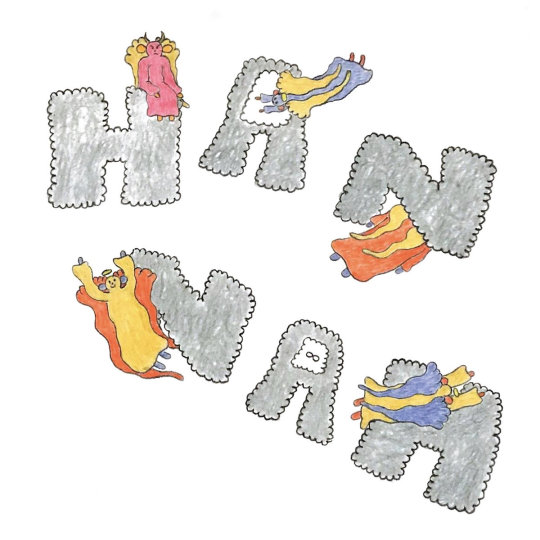
Lomelda - Hannah (Double Double Whammy)
What does it mean to title an album after yourself? Lomelda’s latest album is centered around discovering more about yourself while not always having the answers. Despite the lyrical content, the album is self-assured. Hannah Read’s voice feels as steady as ever as it navigates these twisting questions, like the way the world can shift after a kiss. She finds power in softness and reflection throughout the album, like when she explores the mantra-like words of “Wonder” or through a reminder to do no harm in “Hannah Sun”. In a year that allowed for perhaps more reflection than usual, Hannah makes space for the questions that arise out of figuring yourself out, of making sense of the messiness of it all, wrapped in warm guitar, balanced vocals, and steady drums. - LL
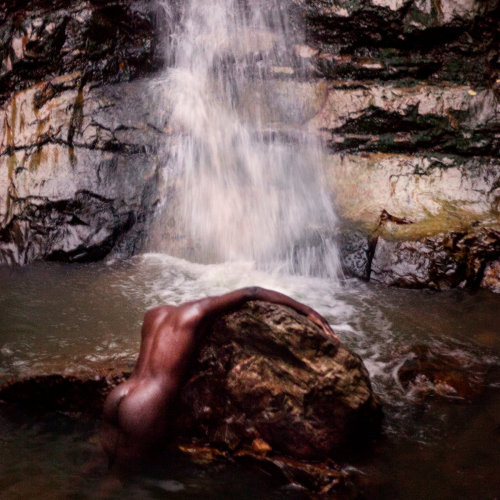
Moses Sumney - Grae (Jagjaguwar)
“Am I vital / If my heart is idle? / Am I doomed?” Moses Sumney famously sang on his stunning 2017 debut Aromanticism, an album that saw him developing his acceptance of being alone. grae, his two-part 2nd full-length, and his first since officially moving from L.A. to the Appalachian Mountains of Asheville, North Carolina, doubles down on themes of heartbreak, but instead of being sure in his seclusion, he embraces the unknown. The album teeters between interludes of platitudes about isolation and ruminations on failed human connection, and maximally arranged clutches of uncertainty. “When my mind’s clouded and filled with doubt / That’s when I feel the most alive,” Sumney coos over horns and piano on slinky soul song “Cut Me”; it’s an effective mantra for the album.
Read the rest of our review here.
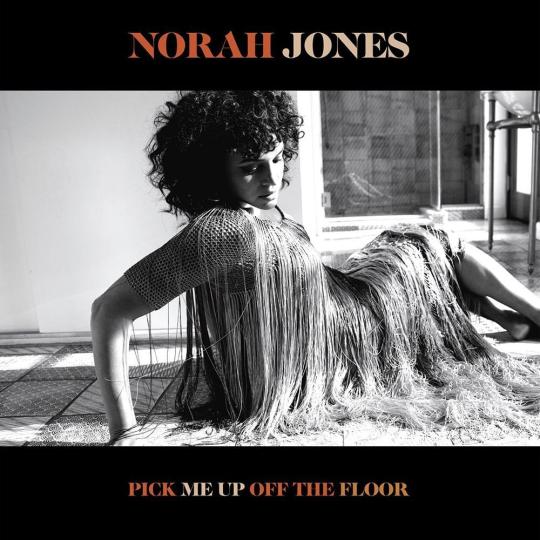
Norah Jones - Pick Me Up Off The Floor (Blue Note)
At the time we previewed Norah Jones’ 7th studio album, she had only released a few tracks from it. Turns out the rest was just as powerful. From the blues stomp of “Flame Twin” to the rolling piano stylings of “Hurts to Be Alone”, Pick Me Up Off The Floor is an album full of jazzy orchestrations and soul and gospel-indebted arrangements, Jones’ silky, yearning voice tying together the simple, yet lush and deep instrumentation. And that other Tweedy feature, that closes the album? It’s a heartbreaking portrait of loneliness, one of many on a record that still manages to celebrate being alive all the while. - JM
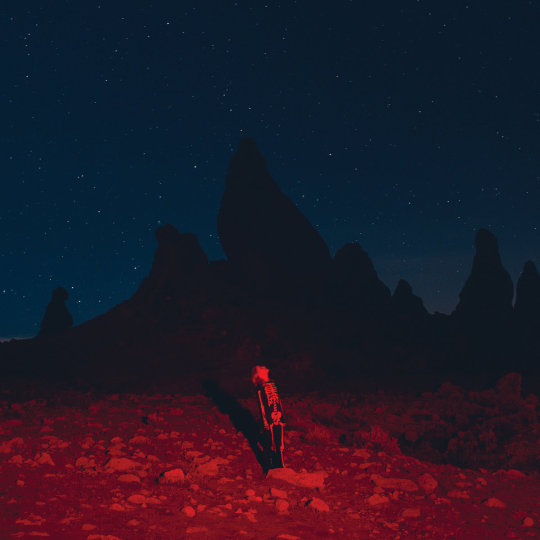
Phoebe Bridgers - Punisher (Dead Oceans)
Phoebe Bridgers is a master of details. Her lyrics shine when they get specific. They range from the mundane to morbid: A superfan’s ghost-like wandering under a drugstore’s fluorescent lights, a skinhead likely buried under a blooming garden, reckoning with the you in “Moon Song”’s lines, “You are sick, and you’re married / And you might be dying.” Bridgers has always been able to set a scene meticulously, and Punisher arrived with 11 songs that expanded that skill, both lyrically and musically, with her dark humor intact and a fuller sound that includes her boygenuis collaborators’ harmonies. - LL
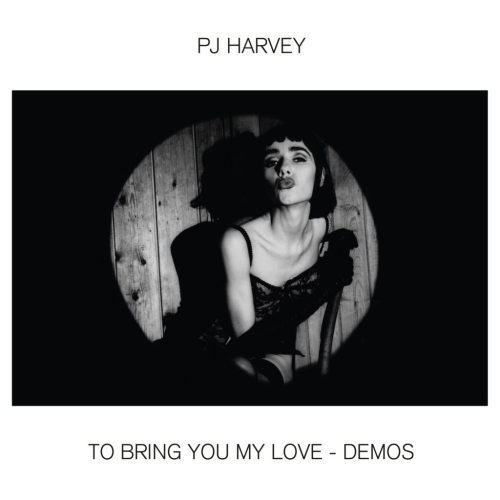
PJ Harvey - To Bring You My Love: The Demos & Dry - The Demos (Island)
Yes, revisiting Dry’s demos as a separate entity is still worthwhile. Harvey’s powerhouse vocal performance carries the acoustic strummed “Oh My Lover”, while the comparatively minimal arrangement of “Victory” highlights bluesy riffing, call-and-response harmonies, and layered guitar and vocals. The singles, the slinky and sharp “Dress” and propulsive anthem “Sheela-Na-Gig”, hold up to their ultimate studio versions, too. But it’s the To Bring You My Love material that provides novelty because it’s never been released and more so because it encompasses the greatest aesthetic contrast from the album. From the warbling hues and guitar lines of the title track to the tremolo haze of “Teclo” to the crisp snares of “Working With The Man”, the demos show a continuity and level of cohesiveness with the diversity of Dry and Rid of Me not shown on the studio version of Harvey’s more accessible commercial breakout. (Predictably, the album’s most well-known song, “Down by the Water”, is the closest to its eventual version.) “Long Snake Moan” is simultaneously more spacious and more noisy, its garage blues a total contrast to the lurking “I Think I’m A Mother” and swaying shanty “Send His Love To Me”. And “The Dancer” fully embraces its flamenco influences, hand claps and all.

Porridge Radio - Every Bad (Secretly Canadian)
Is there a better opening line than “I’m bored to death, let’s argue”? That kind of duality is found across all of Every Bad as it grapples with the frustrations and anxiety of trying to figure it all out, whatever that might mean for you. “Maybe I was born confused, but I’m not,” vocalist Dana Margolin repeats throughout the opening track, roping in listeners with the dizzying feeling of trying to make sense of yourself. The band’s guitar and synth sound coupled with Margolin’s howl makes for a dance party filled with dread, rendering Margolin’s already strong, repetitive lyrics even more spiraling. And yet, by the time we get to “Lilacs”, a glimmer of something else shines through as the music gets more manic and Margolin’s voice begins to soar: “I don’t want to get bitter / I want us to get better / I want us to be kinder / To ourselves and to each other.” - LL
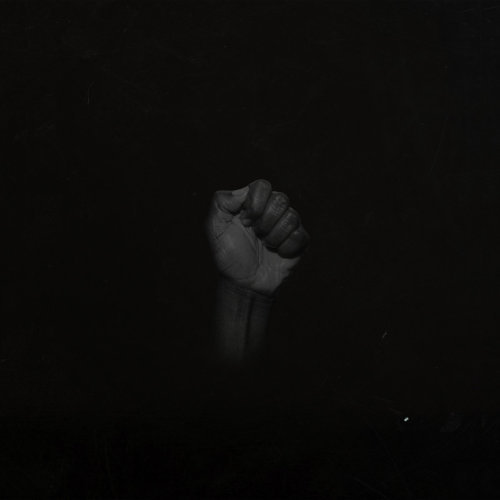
Sault - Untitled (Rise) & Untitled (Black Is) (Forever Living Originals)
Yes, Black Is still pulls plenty of devastating punches. “Eternal Life”, a segue from the gospel boost of “US”, juxtaposes a deliberate drum beat with zooming synths, both ascending like a chorus of angels, as they sing, “I see sadness in your eye / ‘Cause I know you don’t wanna die,” presenting the oppression of Black life at the hands of white supremacy in inarguable terms. Ultimately, though, it’s the anthemic nature of the songs, resistant of platitudes, that shines through. “Nobody cared / This generation cares,” says Laurette Josiah on “This Generation”. Whether she’s talking about young people in general or the latest generation of young Black leaders, the sentiment is reflected on songs like “Black”, wherein over dynamic, sinewy instrumentation, the singers alternate between encouragement, support, and love of the self and others.
Read our full review here.
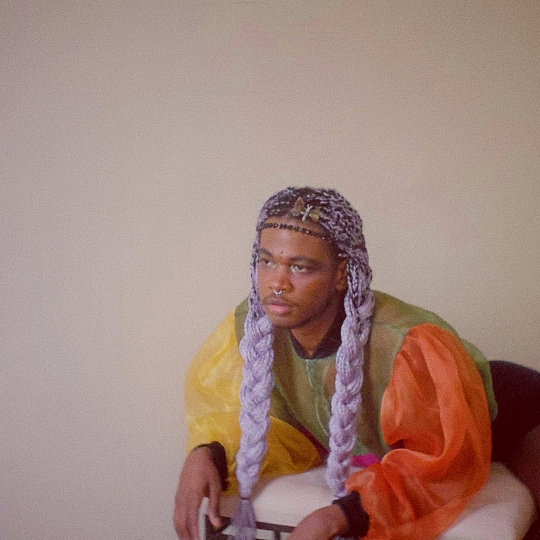
Shamir - Shamir (self-released)
Shamir’s voice is a bright beacon in a sea of conventional singers. Shamir captures the effervescence of pop music and weaves it together with elements of country, alt rock, and diary confessional lyrics all supported by the emotion and range of his vocals. There’s something for everyone across the album’s 11 shimmering tracks. Lead single and opener “On My Own” feels like a declaration of self and self-sufficiency, an anthem of a breakup song. The almost pop-punk bounce of “Pretty When I’m Sad”, paired perfectly with lines like the angst-ridden, “Let’s fuck around inside each other’s heads,” feels impossible to not bop along to. The twang of “Other Side” would put a country crooner to shame. That’s the power of Shamir. His voice has the ability to smoothly convey joy, resilience, and humor. He uses elements of several genres, not just the dance-pop of his debut, to build a unique album that gives listeners so much to sift through and, of course, dance to. - LL
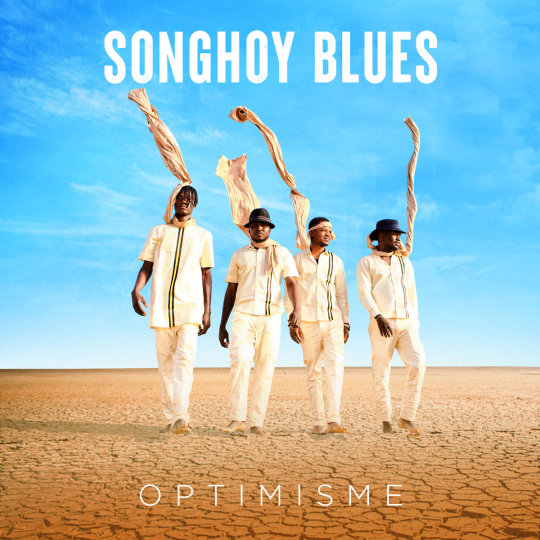
Songhoy Blues - Optimisme (Fat Possum)
If Songhoy Blues’ second album Resistance lacked “the grit of its predecessor,” it’s clear from the hard rock stomp of the opening track of Malian band’s third album Optimisme that they rediscovered their mojo. More importantly, they couple this maximal brashness with tributes to those who make their world a better place: fighters for freedom, women, the young. It’s perhaps the first Songhoy Blues record to truly combine the celebratory nature of their desert blues with a balanced mixture of idealism and vigor. - JM
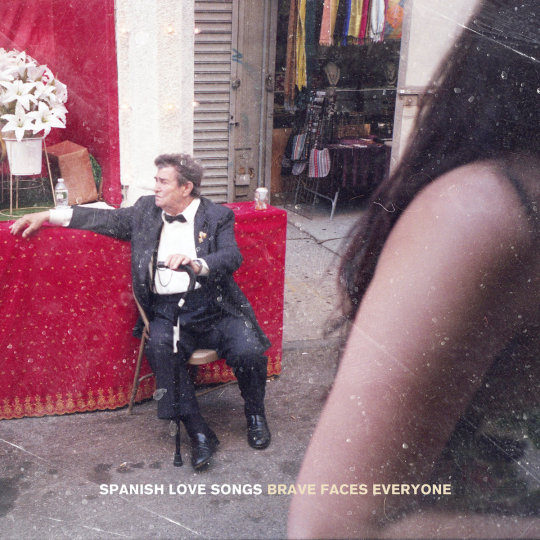
Spanish Love Songs - Brave Faces Everyone (Pure Noise)
How can you find hope in hopelessness, or optimism when every news story points to cruelty? Is it naïve to keep searching for light in the dark? I don’t think so, and I don’t think Spanish Love Songs does, either. I’d like to think we both believe that’s not naivety, but power. It’s the embers you need to really ignite a flame. After all, this is the band with a song titled “Optimism (As a Radical Life Choice)”. It’s a band whose crunching guitars and earnestness insist that despite death and depression and addiction, the instinct to survive shines brightly above all. That relentless hope resurfaces across Brave Faces Everyone’s 10 tracks even as it works through the bleakness of everyday life. - LL

Tashi Dorji - Stateless (Drag City)
The magnum opus from the Asheville-based picker is a group of evocatively titled, disorderly songs about the desolate hellscape of America for outsiders and immigrants. Enigmatic in its nature, not exactly narrative, Stateless combines Dorji’s urgent strumming with moody motifs, captured beautifully in a studio setting for maximum emotional wallop. - JM

Touche Amore - Lament (Epitaph)
Is this what an almost uplifting Touche Amore album sounds like? It’s cathartic in a newer way for the band, especially after the beautifully rendered grief of Stage Four. Lament loses none of the band’s aggression or urgency. “Come Heroine” thrusts listeners into that urgency and introduces a moment of warmth, Jeremy Bolm’s vocals still rasping and insistent: “You brought me in / You took to me / And reversed the atrophy.” The bounciness of “Reminders” may seem close to optimism, but a sharper look at the lyrics uncovers more than blindly looking to the things that bring joy. “I’ll Be Your Host” is reflective, a few years removed from Touche Amore’s previous album and the immediacy of loss, self-aware and growing, but still raw. The album closer, “A Forecast”, takes a turn, a lone voice and piano acting as a confessional before giving way to thrashing guitars and the realization that growth and reckoning with trauma doesn’t mean minimizing it. It means learning to keep moving forward and to stop for help when you may need it. - LL

Waxahatchee - Saint Cloud (Merge)
The best album yet from Katie Crutchfield is inspired by positive personal change (getting sober, dealing with codependency issues, her blossoming love with singer-songwriter Kevin Morby) and reflections on family and friends. Named after the suburb of Orlando where her father’s from, Saint Cloud is a genre-hopping collection of stories and feelings that doesn’t necessarily follow any semblance of narrative. On opener “Oxbow” and country-tinged ditty “Can’t Do Much”, Crutchfield’s increasingly aware of the need to pick your side and your battles, whether in the relationship between two people or between the allure of the bottle and the next-day hangover. Some of the best songs on the album see her finding commonalities with others as a means towards self-love. Gentle strummer “The Eye” refers to her natural creative relationships with Morby and her sister Allison. “War” she wrote for herself and best friend, who is also sober, the title a metaphor for one’s fight to remain substance-free. “Witches” is an ode to her best friends, including Allison and Snail Mail’s Lindsey Jordan, all equally frustrated by the toxic nature of the music industry and the world at large, ultimately lifting each other up because they simply have each other.
Read our full review here.
#autechre#against all logic#bartees strange#charli xcx#christine and the queens#dogleg#dua lipa#emma ruth rundle & thou#fiona apple#haim#irreversible entanglements#jeff parker#jeff rosenstock#jessie ware#laura marling#les amazones d'afrique#lianne la havas#lomelda#moses sumney#norah jones#phoebe bridgers#pj harvey#porridge radio#sault#shamir#songhoy blues#spanish love songs#tashi dorji#touche amore#waxahatchee
66 notes
·
View notes
Text
The Boundless Optimism of BTS
IT IS THE MORNING OF CHUSEOK, A KOREAN HARVEST FESTIVAL akin to Thanksgiving, and the members of BTS would normally be spending it with their families, eating tteokguk, a traditional rice-cake soup. Instead, Jin, 28; Suga, 27; J-Hope, 26; RM, 26; Jimin, 25; V, 24; and Jung Kook, 23, are working. Practicing. Honing their choreography. In a few days, the biggest musical act in the world will perform in the live-stream concert that, for now, will have to stand in for the massive tour they spent the first part of this year rehearsing. At this moment, they’re seated inside Big Hit Entertainment headquarters in Seoul, South Korea, the house they built, dressed mostly in black and white, ready to answer my questions. They’re gracious about it. And groggy.
Before I’m done speaking with them for this story, BTS will have the number-one and number-two songs on the BillboardHot 100, a feat that’s been achieved only a handful of times in the sixty-odd years the chart has existed. Their next album, Be, is weeks away from being released, and speculation about the record, the tracklist, the statement, is rampant across the Internet. BTS are, to put it mildly, huge.
There is something about complete world domination that can really cement a friendship. What jumps out at me as I connect with the members of BTS is their level of comfort with one another. Tension has a way of making itself evident—even over Zoom, even through a translator. There’s none to be found here. They are relaxed in the manner of family. Lounging with their arms around each other’s shoulders, tugging on each other’s sleeves, fixing each other’s collars. When they speak about one another, it is with kindness.
“Jimin has a particular passion for the stage and really thinks about performance, and in that sense, there are many things to learn from him,” J-Hope says. “Despite all the things he has accomplished, he still tries his best and brings something new to the table, and I really want to applaud him for that.”
“Thank you for saying all these things about me,” Jimin responds.
Jimin turns his attention to V, explaining that he is “loved by so many” and describing him as one of his best friends. Suga jumps in, sharing that Jimin and V fight the most among the group. V replies, “We haven’t fought in three years!” They tell me this distinction now belongs to Jin and Jung Kook, the oldest and youngest members. “It all starts as a joke, but then it gets serious,” Jimin says.
Jin agrees and recounts what their arguments sound like. “Why did you hit me so hard?” he says, before mimicking Jung Kook’s response: “I didn’t hit you that hard.” And then they start hitting each other. But not that hard.
Since the start of their careers, BTS have shown a certain confidence in their aesthetic, their performances, and their music videos. It’s right there in the name: BTS stands for “Bangtan Sonyeondan,” which translates to “Bulletproof Boy Scouts,” but as their popularity grew in English-speaking markets, the acronym was retrofitted to mean “Beyond the Scene,” which Big Hit has described as “symbolizing youth who don’t settle for their current reality and instead open the door and go forward to achieve growth.” And their affection with one another, their vulnerability and emotional openness in their lives and in their lyrics, strikes me as more grown-up and masculine than all the frantic and perpetual box-checking and tone-policing that American boys force themselves and their peers to do. It looks like the future.
“There is this culture where masculinity is defined by certain emotions, characteristics. I’m not fond of these expressions,” Suga tells me. “What does being masculine mean? People’s conditions vary day by day. Sometimes you’re in a good condition; sometimes you aren’t. Based on that, you get an idea of your physical health. And that same thing applies mentally. Some days you’re in a good state; sometimes you’re not. Many pretend to be okay, saying that they’re not ‘weak,’ as if that would make you a weak person. I don’t think that’s right. People won’t say you’re a weak person if your physical condition is not that good. It should be the same for the mental condition as well. Society should be more understanding.”
When I hear these words in October 2020, from my house in a country whose leader is actively trying to make the case that only the weak die of COVID-19, well, it sounds like the future, too.
IF YOU ARE JUST NOW CONSIDERING GETTING INTO BTS, IT IS natural to feel overwhelmed by the sheer amount of stuff. It’s a bit like saying, right this second, “Let’s see what Marvel Comics is all about.” In the streaming age, BTS have sold more than twenty million physical units across fourteen albums. Their multi-album concept cycles, The Most Beautiful Moment in Life, Love Yourself, and Map of the Soul, have unfolded over multiple records and EPs. There are collaborations with brands, including a BTS smartphone with Samsung. There is a series of short films and music videos, called BU, or BTS Universe, and an animated universe called BT21, in which they’re all represented by gender-neutral avatars. Their fan base, known as ARMY, is a global cultural movement unto itself.
“Dynamite,” their first English-language single and their first American number one, is pure, ecstatic pop. Shiny and joyful. What sets them apart from many of their peers, and many of the pop acts who achieved worldwide fame before them, is what came earlier. Beneath the sheen and the beats has always been an unflinching examination of human emotion. Their lyrics seek to challenge the conventions of society—to question and even denounce them. BTS’s first single, “No More Dream,” unveiled at their debut showcase in June 2013, concerns the intense pressure South Korean schoolchildren face to conform and to succeed. According to Suga, lyrics about the mental health of young people were mostly absent in Korean pop music. “The reason I started making music is because I grew up listening for lyrics that speak about dreams, hopes, and social issues,” he tells me. “It just came naturally to me when making music.”
Suga’s early ambition of making music didn’t involve him being in a group at all. About a decade ago, in his hometown of Daegu, the fourth-largest city in South Korea, he started recording underground rap tracks under the name Gloss, listening to and learning from the early works of songwriter and producer Bang Si-hyuk, known as Hitman Bang. Bang is the founder and CEO of Big Hit Entertainment. In 2010, Suga, a junior in high school, moved to Seoul to join Big Hit as a producer and rapper. Then Bang asked him to become part of a group, envisioning a hip-hop act with fellow new Big Hit recruits RM and J-Hope. The guys call this “season one” of their development.
“At that time, I don’t think our label exactly knew what to do with us,” RM says. “They just basically let us be and we had some lessons, but we also just chilled and made music sometimes.”
It got more intense. The family grew, occasionally by accident.
V accompanied a friend to a Big Hit casting call in Daegu for moral support and ended up being the person chosen from those sessions.
Jung Kook was signed in a feeding frenzy after being dropped from the talent show Superstar K, fielding offers from numerous entertainment companies before settling on Big Hit because he was impressed by RM’s rapping.
Jimin was a dance student and class president for nine years running at his school in Busan; he auditioned at the behest of his teacher.
And then, to hear him tell it, Jin got picked up off the street. “I was just going to school,” he says. “Someone from the company approached me, like, ‘Oh, this is my first time seeing anyone that looked like this.’ He suggested having a meeting with me.”
“Season two is when we officially underwent hard training,” J-Hope says. “We started dancing, and that’s how I would say our team building started.”
School in the daytime, training at night. “We slept during classes,” V says.
“I slept in the practice studio,” J-Hope counters.
Hitman Bang kept the pressure comparatively low. And he encouraged the guys to write and produce their own music, to be honest about their emotions in their lyrics. Suga is on record saying that no BTS album would be complete without a track that scrutinizes society.
And yet for their new album, Be, they’re putting that aside. Even this has a greater purpose that relates to mental wellness: RM, the group’s main rapper, says, “I don’t think this album will have any songs that criticize social issues. Everybody is going through very trying times right now. So I don’t think there will be any songs that will be that aggressive.”
Though the new rules of COVID-19 mean they can’t come here and promote Be, its first single might not have happened in the first place but for the pandemic. “ ‘Dynamite’ wouldn’t be here if there was no COVID-19,” says RM. “For this song, we wanted to go easy and simple and positive. Not some, like, deep vibes or shadows. We just wanted to go easy.”
Jin agrees. “We were trying to convey the message of healing and comfort to our fans.” He pauses. “World domination wasn’t actually our plan when we were releasing ‘Dynamite.’ ” World domination just happens sometimes. You get it.
MAP OF THE SOUL ONE AIRED VIA THEIR ONLINE FAN PLATFORM and attracted almost a million viewers across 191 countries. The guys say they tried not to think about the enormousness. J-Hope adds, “I felt a little bit more nervous knowing that this was being broadcast live. I actually feel less nervous performing live at a stadium.” Jin replies with a smile, “J-Hope, born to perform at a stadium.”
The graphic layout of the title throws a colon between the final N and E, which makes it look like Map of the Soul On: E, and as I watch it live, as I do in my office at 3:00 a.m. with noise-canceling headphones and a steaming pot of coffee, it feels a lot like I’m watching Map of the Soul on E. It is an explosion of color and fashion and passion, over four gigantic stages, from the boozy swagger of “Dionysus” to the emo-trap introspection of “Black Swan.” Not a step, not a gesture, not a hair is out of place. If there were nerves, they didn’t come through.
There is also, at the end of Map of the Soul One, an intimate version of their 2017 track “Spring Day,” which encapsulates what’s really made BTS stand out. On the surface, it’s about nonspecific love and loss, about yearning for the past. “I think that song really represents me,” says Jin. “I like to look to the past and be lost in it.”
Fair enough, but there is an undeniable allusion, in both the song’s video and its cover concept, to a specific incident in recent South Korean history. “Spring Day” was released just a few years after the sinking of the Sewol ferry, one of the country’s biggest maritime disasters, in which a poorly inspected, overloaded ferry toppled in a sharp right turn. Hundreds of high school students drowned, having obeyed orders to stay in their cabins as the boat was going down. According to some reports, the South Korean government actively tried to silence entertainers who spoke out against it, with the Korean Ministry of Education fully banning the tragedy’s commemorative yellow ribbons in schools. I ask whether it was about a specific sad event, and Jin tells me, “It is about a sad event, as you said, but it is also about longing.” The song kept the disaster front of mind for young Koreans and for the media, indirectly leading to the impeachment and removal of then president Park Geun-hye.
If an overburdened, undermaintained, slow-moving vessel capsizing because of a reckless rightward turn strikes you as somehow symbolic of the country in which BTS are about to explode even further, you won’t hear it from them. “We’re outsiders—we can’t really express what we feel about the United States,” says V. But their actions speak volumes; in the wake of the George Floyd murder and subsequent protests in America, the group made a $1 million donation with Big Hit Entertainment to Black Lives Matter, one that was matched by BTS ARMY.
The fans offer a fascinating inversion of stan culture: Rather than bullying rivals like many other ardent online fan bases do, ARMY have put the positive message of the music into action. Their activism goes deep. Through micro-donations, they’ve regrown rain forests, adopted whales, funded hundreds of hours of dance classes for Rwandan youth, and raised money to feed LGBTQ refugees around the world. Where pop fans a generation ago might have sent teddy bears or cards to their idols for their birthdays, where five years ago they might have promoted a hashtag to get a video’s YouTube viewer count up, for RM’s twenty-sixth birthday in September, international fan collective One in an Army raised more than $20,000 for digital night schools to improve rural children’s access to education during the COVID-19 crisis. ARMY may have even entered the conversation around the 2020 presidential election when hundreds of thousands of Tulsa Trump rally tickets got snapped up online in June. The event’s actual attendance was pathetically low. No particular person or entity claimed credit for this top-notch trolling, but a video urging BTS fans to RSVP to that rally did get hundreds of thousands of views. We have no choice but to stan this fan base.
The relationship is intense. “We and our ARMY are always charging each other’s batteries,” RM says. “When we feel exhausted, when we hear the news all over the world, the tutoring programs, and donations, and every good thing, we feel responsible for all of this.” The music may have inspired the good works, but the good works inspire the music. “We’ve got to be greater; we’ve got to be better,” RM continues. “All those behaviors always influence us to be better people, before all this music and artist stuff.”
Yet for every devoted member of BTS ARMY, there is someone who’s looked right past BTS. Jimmy Fallon, whose Tonight Show hosted the group for a full week this past fall, was one of those people. “Usually if an artist is on the rise, I hear about them ahead of time. With BTS, I knew they had crazy momentum, and I’d never heard of them.”
Here’s a thought that used to be funny to me: There were members of the live audience of The Ed Sullivan Showon February 9, 1964, who weren’t there to see the Beatles. Elvis was in the Army, Buddy Holly was gone, and the three number-one albums in the months before Meet the Beatles! were an Allan Sherman comedy record, the West Side Story original cast recording, and Soeur Sourire: The Singing Nun. America had left rock ’n’ roll behind for the moment, and with the culture aimless and fragmented, it wasn’t quite sure what to pick up in its place. It is possible to imagine that a youngish, reasonably hip, and culturally aware human being might cop a ticket to that week’s show, settle into his seat, and say, “Bring on a medley of numbers from the Broadway musical Oliver! and banjo sensation Tessie O’Shea.”
The instinct is to laugh at that guy, and it’s a good instinct, because what a dope.
And then you become that guy.
Sometimes there is a whole universe alongside your own, bursting with color you’re too stubborn to see, bouncing with joy you think is for someone else, with a beat you thought you were finished dancing to. BTS are the biggest thing on the planet right now, yet the job of introducing them to someone new, particularly in America, seems like it’s never done. Maybe it’s because they are adored by screaming teenagers and we live in a society patriarchal enough to forget that screaming teenagers are nearly always right. Maybe it’s the cultural divide, in a moment when our country is unashamed enough of its own xenophobia to get openly bent out of shape when it has to press 1 for English. Maybe it’s the language barrier, as though we understood a single word Michael Stipe sang before 1989.
Whatever the reason, the result is that you might be missing out on a paradigm shift and a historic moment of pop greatness.
IF BTS SEEM A BIT CAUTIOUS WITH THEIR WORDS PUBLICLY, IT’S because—perhaps more than any other massive pop act in history—they have to be. Shortly after our second meeting, BTS were given the General James A. Van Fleet Award by the U. S.–based Korea Society for their outstanding contributions to advancing relations between the United States and Korea. In his acceptance speech, RM said, “We will always remember the history of pain that our two nations shared together, and the sacrifices of countless men and women,” as seemingly diplomatic and innocuous a statement as he could have made. But because he didn’t mention the Chinese soldiers who died in the Korean War, it didn’t go over well. The Samsung BTS smartphone disappeared from Chinese e-commerce platforms, Fila and Hyundai pulled ads in China that featured the group, the nationalistic newspaper Global Times accused them of hurting Chinese citizens’ feelings and negating history, and the hashtags “BTS humiliated China” and “there are no idols that come before my country” began trending on the social-media site Weibo. The pressure is not small.
Even as the number-one pop group in the world, even with their hard work day in and day out, even with tens of millions of adoring fans redefining the concept of “adoring fans” by literally healing the planet in their name, these guys still suffer from impostor syndrome. RM explains, “I’ve heard that there’s this mask complex. Seventy percent of so-called successful people have this, mentally. It’s basically this: There’s this mask on my face. And these people are afraid that someone is going to take off this mask. We have those fears as well. But I said 70 percent, so I think it’s very natural. Sometimes it’s a condition to be successful. Humans are imperfect, and we have these flaws and defects. And one way to deal with all this pressure and weight is to admit the shadows.”
The music helps. “When we write the songs and lyrics, we study these emotions, we are aware of that situation, and we relate to that emotionally,” J-Hope says. “And that’s why when the song is released, we listen to it and get consolation from those songs as well. I think our fans also feel those emotions, maybe even more than us. And I think we are a positive influence on each other.”
If there’s one thing they’re sacrificing, besides free time and the ability to speak freely without the Chinese foreign ministry releasing an official statement, it’s a love life. I ask about dating, broad questions like “Are you?” and “Is there time?” and “Can you?” and the answer to all of them is pretty clear: “No.” “The most important thing for us now is to sleep,” Jung Kook insists. Suga follows right up with “Can you see my dark circles?” I cannot, because there are none, because flawless skin translates even over Zoom when there’s an ocean between us.
So they’re not, at least publicly, having romantic relationships with anyone. If there is a strong relationship that’s guided their journey into adulthood, it’s with Big Hit. “Our company started with twenty to thirty people, but now we have a company with so many employees,” RM says. “We have our fans, and we have our music. So we have a lot of things that we have to be responsible for, to safeguard.” He considers it for a moment. “I think that’s what an adult is.”
“Our love life—twenty-four hours, seven days a week—is with all the ARMYs all over the world,” RM adds.
In a world that is determined to sand down anything that isn’t immediately recognizable to the average pop-music fan, when it comes to acquainting you with Korean culture, BTS very much do not wanna hold your hand. While the first song on night one of their Tonight Show week was a joyous but expected take on “Dynamite” with Fallon and the Roots, they took some chances during their second performance.
As a friend of mine, a thirty-three-year-old BTS fan in Los Angeles, told me, “The second song they performed was ‘IDOL,’ ” from 2018’s Love Yourself: Answer, “and it celebrated their Korean identity. They performed it in Gyeongbokgung Palace in Seoul. They wore clothes inspired by traditional dresses called hanboks;it was almost entirely in Korean, so it felt super subversive. As a fan, I read it as: ‘Dynamite’ was an invitation, and this is who we are and this is our home.”
“I was a little concerned that people might not understand,” Fallon says. “I was like, ‘There’s nothing in English here.’ But what you see is just pure star power. Pure talent. Immediately, I thought, Oh, this is everything. If you’re that powerful, it transcends language.”
American popular music in the twenty-first century is more fragmented than it has been since . . . well, since Allan Sherman, Leonard Bernstein and Stephen Sondheim, and the Singing Nun battled for that number-one spot. The monoculture that the Beatles helped bring on has breathed its last breath. Each of us is the program director for our own private radio station, letting our own past habits and streaming-service algorithms serve up something close to what we want. Which is great, except that huge moments can whiz right past our ears. Each of us, even if we’re more clued in than our parents were when they were our age, can miss some era-defining, excellent shit. Particularly if the radio is our Spotify Discover Weekly, or the Pandora channel based on the band whose T-shirts we wore in college. We can let a moment pass us by if prime time is a Netflix binge, and the Tonight Show hour is spent on one more episode before bed. But we shouldn’t. “Honestly, I think it’s history that we’re living through with BTS,” Fallon says. “It’s the biggest band I’ve seen since I’ve started late night, definitely.”
THERE IS ALSO THE SMALL DETAIL THAT, UNLIKE THE BEATLES AND literally every other worldwide sensation to break in America, BTS don’t particularly need to go to the trouble. They are massive all over the world. Thanks to the recent IPO of Big Hit Entertainment, of which each member is a partner, they are all now incredibly wealthy. (Hitman Bang is the first South Korean entertainment mogul to become a billionaire.) What good is a culture in decline to a pop act this much on the ascent? “When I dreamed of becoming an artist, I listened to pop and watched all the awards shows in the United States. Being successful and being a hit in the U. S. is, of course, such an honor as an artist,” says Suga. “I feel very proud of that.”
They’re breaking out in a country that either worships them or fails to notice them. So do they feel like they’re getting enough respect in America? “How can we win everyone’s respect?” Jin asks. “I think it’s enough to get respect from people who support us. It’s similar everywhere else in the world. You can’t like everyone, and I think it’s enough to be respected by people who really love you.”
Suga agrees. “You can’t always be comfortable, and I think it’s all part of life. Honestly, we are not used to getting a ton of respect from when we first started out. But I think that gradually changes, whether it be in the States or other parts of the world, as we do more and more.”
There is, without a doubt, one colossal, unmistakable sign of respect for a musician: a Grammy. They’ve been nominated only once, and even then it was for best recording package. But their sights are set on a big one next year. RM puts it out there: “We would like to be nominated and possibly get an award.” Dragging the hoary, backward-looking, and Western-focused Grammys into the gorgeous, global world of the present through sheer force of will, talent, and hard work? Stranger things have happened. “I think the Grammys are the last part, like the final part of the whole American journey,” he says with a smile. “So yeah, we’ll see.”
The Recording Academy’s seal of approval is one thing. But BTS have already conquered the world, clowned tyrants, inspired individual fans to perform the small and achievable acts of activism that have collectively begun to save the planet, challenged toxic masculinity by leading with vulnerability, and, along the way, become bajillionaires and international idols. Whether the Grammys are paying attention matters about as much as what an Ed Sullivan audience member expected to see that night in 1964. BTS have already won.
© source
52 notes
·
View notes
Text
Rolling Stone India: The Philosophy of Agust D

On May 22nd 2020, South Korean superstars BTS’ rapper and producer SUGA made his solo comeback with his alias Agust D. As expected, it was a comeback of record-shattering proportions, the success of the sophomore mixtape D-2 making him the first Korean soloist to have two number-one hits on the Worldwide iTunes Album Chart and first Korean soloist to chart number one on both Worldwide iTunes & Apple Music Albums Chart simultaneously. The video for the lead single “Daechwita” also became the fastest music video by a Korean soloist to reach four million likes on YouTube in just 11 hours, making Agust D the only Korean soloist to have four music videos with over three million likes on YouTube. That’s a lot of numbers to process–especially for a free mixtape that dropped with little to no warning–so the usual question of ‘why?’ arose pretty quickly among new audiences. Of course if you’re familiar with BTS, you understand the group’s titanic power on social media; everything they touch pretty much turns to gold and their fandom ARMY is the most powerful of its kind on the planet. The group address various social issues in their songwriting and music videos, pushing forth a message of self-love and positivity. However Agust D hits a little different...
Of course, BTS have no dearth of deep symbolism in their artistry, it’s the main reason I became a fan back in 2015 but after we got our first taste of the group’s rapper SUGA’s alter ego Agust D… my perception shifted. There’s honesty in Agust D’s work that’s hard to face because it so closely resembles our demons, but it’s that honesty that cemented him as one of my favorite songwriters of all time. Whether he is Min Yoongi, SUGA or Agust D, his work is reflective of the issues our generation struggles with and defines this time in history–to be a millennial living in the age of social media and its ups and downs, constantly exposed to viral fame and cancel culture, anonymous critique and rapid globalization.
I wanted to take a look at some of the deeper symbolism I’ve found within his artistry, especially his most recent release D-2 and its lead single “Daechwita.” Of course a lot of what’s written below are my interpretations of his work and not everyone will agree with what I have to say–but that’s the beauty of art, isn’t it? As Agust D stated about his work in a recent interview with Time, “What’s good is good, and it’s up to the listeners to judge. I just do what I want to do.”
The instant appeal of Agust D
When we first met Agust D in 2016, he sent us into a state of shock with his eponymous debut mixtape. He opened up about his innermost struggles with depression, anxiety, success, failure and poverty, and we simply hadn’t seen any K-pop star bare their soul at this level before. K-pop has always been about cultivating a controversy free, positive image of perfection, but then rose this anarchist with nothing to lose, the underdog who shattered stereotypes with his realistically foul mouth and no-nonsense attitude. Since 2013, we have seen how harmoniously SUGA works within BTS, navigating (and eventually soaring above) the world of K-pop with practiced caution, while Agust D is the spitfire solo rap savior, the rebel against the industry. It’s interesting how he revives underground rap culture while simultaneously rejecting it in his lyricism–spitting on the face of anyone who implies his pop stardom has led him to forget his roots as an underground rapper from Daegu. He called out everyone who disrespected his grind and didn’t bother to mince his words as he pointed out the hypocrisy of those who criticized him for becoming a pop star, but also coveted his fame. In the lyrics for “Give It To Me” he says, “I’m still not sure about the secret to success ../.. But I think I know the secret to failure ../.. The secret is to play the fool just like you ../.. And keep blabbing your mouth ../.. But I wouldn’t live like that even if I had to die.” Big Hit Entertainment was perceptive enough to see the appeal in the anger and arrogance in SUGA’s artistry at the time; I believe this in turn allowed him to unleash Agust D, a more vicious, honest and dangerous part of him. In other words, if SUGA is the persona Min Yoongi uses as a shield, Agust D is his machine gun. The shield isn’t built to protect only Min Yoongi–it’s the part of BTS that looks out for their fans (BTS’ logo is after all evidence to the same.) Agust D is the gun that takes down anyone who dares slander his work, his team and the ARMY.
The inevitable death of the self
In Agust D’s “The Last” the rapper says, “Min Yoongi is dead (I killed him)” which really stuck in my mind because he implies it’s a murder he had to commit to dedicate himself to his craft and to his fans as well as expel in his own head what he thought was a ‘weaker’ self. The part of him that was vulnerable and afraid to rise–perhaps overwhelmed by the attention fame brought–had to die so that a stronger persona could rise to bear the burden. With the metaphorical death of the non-celebrity Min Yoongi, we saw the rise of BTS’ SUGA and eventually the dark and unapologetic Agust D.
It’s a tremendous amount of sacrifice–a concept we see resurrected in the music video for “Daechwita.” Set in a universe that blends the historic with the modern, the video for “Daechwita” is a showdown between two Agust Ds–a king and a rebel. The music video draws inspiration from the 2012 Korean film Masquerade, in which a lowly acrobat takes the role of a double for the notoriously ruthless King Gwanghae. The king in “Daechwita” is similarly a despot, ruling with no mercy, sentencing anyone who dares rise against him to death by beheading and then collecting heads as trophies. The rebel challenges his rule and methods but is captured and like the others sentenced to death. He is saved however, by striking a deal with the executioner, who then hands him a gun with which he is finally able to assassinate the tyrant king. What’s fascinating is that according to the artist, both the king and the rebel can be seen as two different versions of Agust D–two sides of the same coin. He explains in a behind the scenes video “Four years ago Agust D became king. Now another Agust D is confronting him.” As the king, Agust D is the picture of wealth, glamour and success–everything SUGA of BTS has gained since he last donned the mask of Agust D. As the rebel, he returns the raw and honest voice of the people, ready to shake up and transform the system–ironically the ‘new’ version of Agust D is closer to the original.
There is a glorious confidence that comes with being Agust D, but in “Daechwita” he explores the idea of confidence spilling over into conceit. There is a need for Agust D to remember where he came from, and only he can remind himself of that past. Agust D’s honest and raw take on mental health had audiences and critics crown him as the poster child of relatability in 2016–people from all walks of life understood what he was talking about and were able to empathize with his words because depression, anxiety, failure and hard work are elements of life itself. However four years later this king sits high upon on a throne of fame and fortune, the rebel leader has the backing of the people because he has become their voice– returning to the core concept that made Agust D so beloved. They side with him because he comes from the same place they did, has the same system of beliefs and doesn’t put himself on a pedestal. A major indication of this is the quote above the doorway through which the rebel emerges to meet his gang; as explained by Korean YouTube channel ‘Learn Korean’, the quote is originally from Confucius teachings and states, “The classical scholar does not value treasure,” indicating that the goal of Agust D doesn’t lie in the pursuit of material wealth, but lives in the ability to learn, evolve and deliver honest work. It’s a sort of throwback to a moment in “The Last,” where Agust D points out a fear of becoming someone he no longer recognizes: “As time goes by, I feel like I’m turning into a monster/I’ve exchanged my youth for success,/And that monster demands for more wealth/At times it puts a collar on my neck/To ruin and swallow me with greed.” Agust D again has to ‘kill’ a past self to become stronger, to ground himself by not taking success for granted. The death of the past self opens the door for another version of the same artist, something that he believes will happen again in the future, as he points out in his interview on BTS’ YouTube channel about D-2
Min Yoongi, SUGA, Agust D – the masks of the same man

A theory behind “Daechwita” that I particularly liked is the struggle of idol versus artist; the flashy king signifies the glittery world of idol stardom and the rebel is the artist who defies the system–it’s a little reminiscent of the themes SUGA addressed with “Interlude: Shadow” from BTS’ album Map of the Soul: 7 which dropped earlier this year. At the end of the day, SUGA and Agust D are both of these contrasting images–the superstar pop idol versus the underdog rapper. Agust D and BTS leader RM have both addressed their struggles of adapting to the idol world after their backgrounds in underground hip-hop–RM’s 2015 self-titled mixtape, Agust D and BTS’ track “Idol” all provide more context into this, I’d highly recommend listening to them all.
Of course, BTS’ Map of the Soul series saw the entire group dive deep into self-reflection with the utilization of renowned psychologist Carl Jung’s theories about the self. According to Jung, the ‘persona’ is the many masks a human being takes on as they walk through life, each mask suited to a different aspect of their existence. Each mask has a reason for existing and molds the way the rest of the world perceives us as well. In their lyrics, BTS explored the development of the psyche, ego and unconscious mind to understand the links between who they are inside versus the personas we see as an audience. The video and lyrics for SUGA’s solo track from “Interlude: Shadow” also depict a battle with the self, the struggle with evolution and fame. While RM seems to feel uncomfortable with his persona rising above to take center stage over his inner self (“Intro: Persona”), rapper j-hope’s ego seems to embrace his persona’s rise (“Outro: Ego”). SUGA seems to struggle with being able to find a balance between his shadow and ego (“Interlude: Shadow”), appreciating them both for what they brought to his life and unwilling to accept how integral his shadows or fears have been in carving a path into stardom.
The video for “Interlude: Shadow” featured British Indian sculptor Anish Kapoor‘s installation art ‘Svayambh’ — which in Sanskrit means “self-made” or “auto-generated.” An object pushes, forces itself through various doors and is reshaped by that transition and journey, leaving behind marks or ‘parts’ of itself it no longer needs. To me, it’s a metaphor of the massive journey we’re witnessing Min Yoongi, BTS’ SUGA and Agust D take together. Each layer he sheds allows him to expose a new artistic side of himself to the audience, leaving him vulnerable but also very much loved and appreciated. In “Interlude: Shadow” SUGA discusses a fear of the fall that comes from rising to the top, and Agust D’s “Daechwita” implies that perhaps the solution is to make the jump to ground yourself instead of being toppled. A lot of the time I personally see Agust D as the vessel that provides the answers that the artist SUGA needs to accept.
The evolution of the self is a gruelling process since growth involves being able to come to terms with the past and eventually let go of it. The struggles of days gone by shape you, but ultimately need to be left behind. This isn’t necessarily a bad thing, as Agust D explains that since his debut with the mixtape Agust D, he feels calmer, more mature and positively shaped by some of the most trying times of his life.
“It is a documentation of myself as a 28-year-old,” he told Apple Music about D-2. “This is the output of my time in quarantine. In a way, it was a creative silver lining. It was a time during which I was able to learn, again, the meaning of the phrase ‘due to’.” I don’t pretend to understand the person behind Agust D is in real life, because frankly none of us truly know him. Everything we have seen so far is a public persona, whether its Min Yoongi, SUGA or Agust D, and it’s a fact he made very obvious from the start. On “140503 At Dawn” Agust D states, “I always prepare two masks ../.. Hiding my true self ../.. Behind the defensive image ../.. I thoroughly hide myself, ../.. As if I’m a criminal.” It circles back to BTS’ search for identity and balance on the Map of the Soul series. Add to it the element of fame and celebrity, there’s a new depth that makes it all the more challenging for us to fully comprehend because we’re not quite in his shoes and we never will be. But maybe its simpler than we’re all making it out to be. He tells Billboard, “You could say there is and there isn’t [a difference between Min Yoongi, SUGA and Agust D]. “Me” and “Me” and “Me.” They are different and the same.”
Symbolism, imagery and history
As an avid lover of history and philosophy, I particularly enjoy the way he uses Korean history and culture in modern context. A lot of this is more obvious in “Daechwita,” as the video and track bring in historical references to King Gwanghae, the story of Prince Sado and the rice chest, and the culture of Korean ‘untouchables’ who were also known as Baekjeong–those who worked as butchers or executioners (as YouTuber Bookish Theories points out, Agust D is the voice of all people, as he dons a necklace that represents the Baekjeong.) Of course both in Agust D and D-2‘s lyrics, he refers to himself as a ‘born tiger’–a massively important symbol of power, pride and nobility in Korea’s heritage. The larger picture around this symbolism to me is a perfect example of what a millennial artist can do–bring tradition and modernity together to tell a new story, reinterpret mythology, history and folklore to immerse larger, younger audiences and educate them.

The presence of the ‘new’ Agust D in “Daechwita” is also indicative of a new era, a new period of innovative, meaningful artistry not only in the Korean music industry, but also the world. I look at it as Agust D and BTS (represented by the six other men with him) arriving to destroy the outdated concepts and perceptions the king in the video symbolizes–the industry no longer belongs to a monopoly–be it certain labels or countries–there is a seat at the table for everyone. Hell, it’s probably someone else’s turn to host, someone diverse, forward-thinking and revolutionary. In a way, it’s what BTS have already started to accomplish.
Another thing I noticed is about the themes revolving around SUGA’s visual artistry is that he always seems to ‘burn’ in his own anguish while Agust D sets other things ‘aflame’. If you look all the way back at 2015’s “I Need U” and the other videos from The Most Beautiful Moment in Life albums, SUGA sets himself on fire, languishing in the fact that it will destroy him. In his videos as Agust D, the fire is him– he stays unharmed while everything else around him burns. In the videos for “Agust D” and “Give It To Me” he seems immune, not even noticing the heat anymore while his environment spontaneously combusts. The fire makes an appearance again as he faces off against the king in “Daechwita,” lighting the way forward as he takes down yet another enemy, even if that enemy is himself.
I’ve always seen Agust D as the phoenix that rises from the ashes of the challenges BTS’ SUGA has conquered. It’s symbolic of Agust D’s attitude as well as his refusal to let anything stand in the way of his dreams. Of course he always runs the risk of burning himself, but I feel the visuals in “Daechwita” are also indicative of Agust D’s maturity and control over what he says and how he says it.
It’s always incredible to have artists who want you to find your own meaning in their work. You take what you need from it and give it a definition that your mind finds most logical. It’s a form of freedom Agust D grants his audience when he doesn’t explain each release completely. In his interview with Time he explains that his evolution as an artist over the past years made him think about what kind of message he’s putting out into the world. He states, “I just throw the question mark; it’s up to each individual to decide. In my personal opinion, it’s often better for those who have such influence on others to be wary of loudly voicing their biased views.”
The self-fulfilling prophecy
The artist’s path runs parallel to ours, as we accompany him on his journey to discover Min Yoongi, SUGA, Agust D and Agust D-2–the latest ‘version’ of him will also die someday, as will our latest versions of ourselves. It’s a pretty brilliant reminder of the impermanence of life and what makes growth such an integral part of the human experience. Because the search for a balance between being Min Yoongi, Suga and Agust D is what fuels his drive. He tells Apple Music about his personas, “I think it depends on the perspective, but is it possible to view these separately? Regardless of who I am, whether it be SUGA or Agust D, I’ll keep moving towards the essence of life.”
For me, the mixtape Agust D was about the artist understanding why he set out on the path of the idol in the first place, while D-2 is more about remembering why he unleashed Agust D. It’s a revisit within a revisit, a process of learning from the old and molding the new. Through his various interviews, Agust D seems to have found a resolution to what he was searching for. There’s a certain peace that comes from seeing the path of success he put himself on back in 2016 lead to fruits beyond his imagination. He knew he would succeed, prophesied his own success because of the faith he had in himself. Now that he has everything material within his grasp and is metaphorically a ‘king’ as a member of one of the biggest pop acts in history, its about successfully processing the position he is in and how he can proceed from there. “My previous mixtape focused more on being better at rap, better at making music, sound, mix, master and so forth,” he tells Billboard. “I’ve worked on a lot more projects since then and didn’t really try to become perfect. Perfection is an elusive term. I simply just did my best.”
D-2 focuses on lost relationships with friends, the rise to the top, corruption in society, experiencing the music industry and the fear of what comes next. “This is how I’ve lived since August 16th, 2016,” he explains. “If the previous mixtape focused on telling the past, the new one is about the present.” In the opening track “Moonlight” the lyrics say, “Being called immortal is fucking overwhelming ../.. I started just because I liked music ../.. But the adjectives they attach to my name feel too much sometimes.” The raw anger from Agust D has given way to a level-headed constitution born only of experience and age. As we grow older with Agust D, we find resolutions to our biggest problems and achieve our dreams with hard work like he did, the frustration boils down to a sense of calm triumph with a fear of tomorrow that sometimes flashes through the mind. He adds in an interview on BTS’ YouTube channel that D-2 is “the archive of 28-year-old Agust D” – Agust D and I are the same age, so it makes sense that a lot of his lyricism has reflected my realities and state of mind. As he points out, he isn’t the same person he was in 2016 and nor am I–we’ve both grown out of a lot of the early-twenties angst and anchored ourselves as adults. In addition to reassurance, witnessing SUGA and Agust D’s growth since 2015 has given me clarity on establishing one’s true self despite what we show others. I don’t know what the ‘true self’ means to him personally of course, but for me it’s about becoming someone who I can be proud of without losing the essence of what makes me… me. It’s an idea I felt he made clear on D-2‘s “Moonlight,” when he says,
“That moonlight that shines on me at dawn ../.. It’s still the same as then ../.. Changes are fated to happen to everyone ../.. Perhaps, how we change is what our undertaking is about.”
38 notes
·
View notes
Text
[✎ ITA] 032c : Intervista - La rivisitazione di RM | 24.11.2023

🗞 032c #44 Inverno 2023/24
La Rivisitazione di RM
__di FIONA BAE
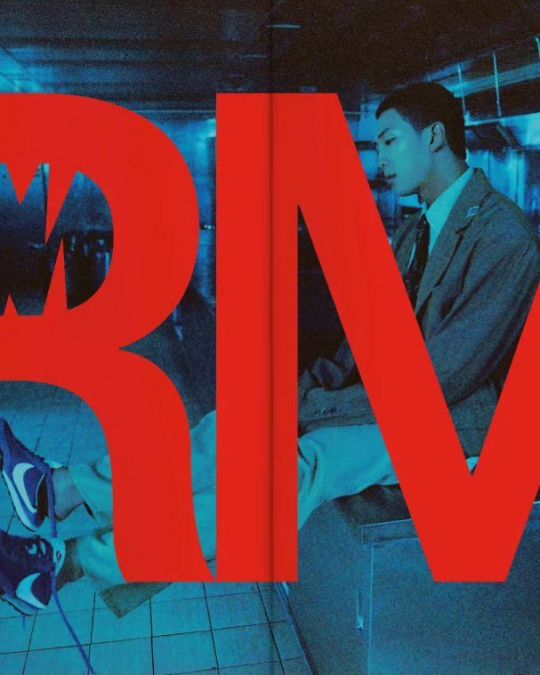
Quando incontro il rapper, cantautore e produttore K-pop RM, avverto una certa urgenza nel suo modo di fare. È appena uscito dallo studio di registrazione, dove sta ultimando il suo nuovo album solista, il secondo dopo Indigo (2022), prima di dover partire per il servizio militare obbligatorio – che durerà 18 mesi. Da bambino, RM – Kim Namjoon, per gli amici – voleva scrivere poesie e ha iniziato a rappare a 15 anni, in un locale della scena underground di Seoul. In quell'occasione, c'erano solo 18 persone nel pubblico. Oggi, invece, i BTS – il gruppo di cui RM (29 anni) è il leader – sono la band K-pop più nota in Corea – e probabilmente nel mondo. Come menzionato in un articolo di Forbes, i BTS (acronimo che originariamente stava per Bangtan Sonyeondan – Boyscout a prova di proiettile in inglese/italiano, ma che ora significa Beyond the Scene) sono l'unico gruppo nella storia della Billboard Global 200 ad aver guadagnato la pos. n.1 di questa classifica ogni anno fin dalla sua istituzione nel 2020. Il New York Times ha descritto il gruppo – formatosi nel 2010 e attualmente in pausa – come una “potenza mastodontica”.
Mentre mi dirigo al luogo dell'intervista, in una calda giornata di fine agosto, mi imbatto in un gruppetto di giovani fan asiatiche mentre scendono al volo da un van scuro e corrono a mettersi in posa di fronte all'insegna della HYBE, presso il quartier generale della multinazionale di intrattenimento. Originariamente nota come Big Hit Entertainment, la Hybe ha fatto costruire il nuovo edificio a marzo 2021. Il grattacielo, dall'aspetto piuttosto minimalista, è diviso in tre parti – con i suoi 19 piani a vista e 7 interrati: la sezione dedicata “ai dipendenti e al welfare”, corredata di palestra, si trova in cima, poi ci sono 9 piani di uffici e 6 preposti alla produzione musicale e di contenuti.
C'è anche un museo dedicato ai BTS, uno spazio adibito ad attico e tantissima sorveglianza.
Vengo accompagnata in un'ordinata sebbene ordinaria sala riunioni - invece che nell'elegante studio di registrazione mansardato di cui ho tanto letto – ed incontro RM. Ha i capelli corti ed indossa una maglietta estiva marrone dal buffo motivo. RM sembra calmo e cordiale, ma c'è anche quell'urgenza.
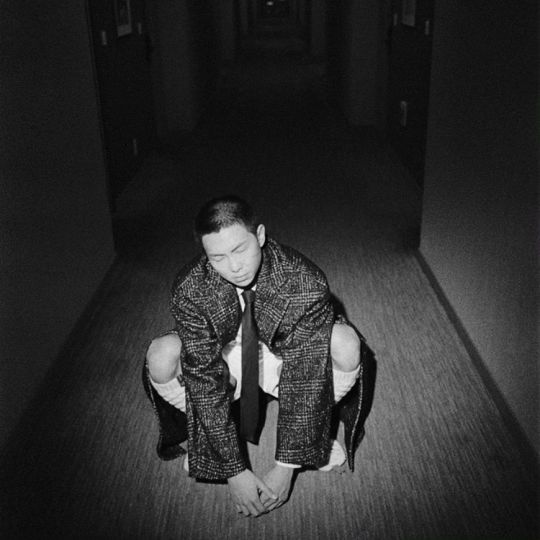
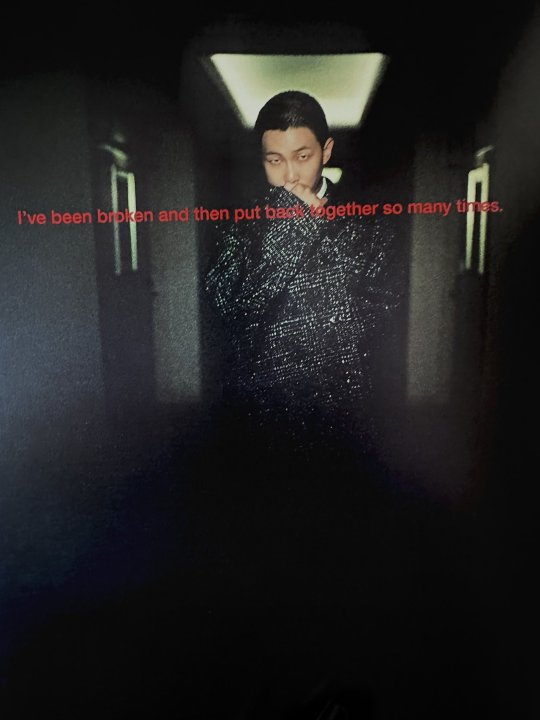
FIONA BAE: Il tuo ultimo album, “Indigo”, era basato sulla ricerca di un'identità. Come sei cambiato e ti sei evoluto negli... 8 mesi successivi al suo rilascio?
RM: Sono successe un sacco di cose. Sia umanamente che professionalmente, ho accusato colpi , sono caduto e poi mi sono rialzato tantissime volte. E ho realizzato che la persona che credevo d'essere in realtà non esiste.
F.B: Come ti descriveresti?
RM: Bella domanda. Non sono un narcisista e mi sono sempre lasciato sopraffare dalle mie insicurezze. Ho talmente tanto sporco, marcio, amore, affetto e considerazione, dentro me, che credo finirei per impazzire, se non li esternassi così candidamente. Se non svelassi questi miei lati al mondo. In un modo o nell'altro. E ci tengo a fare la differenza, a cercare di cambiare le cose, sia che si tratti di me stesso, delle persone attorno a me, dell'industria o del mondo. Credo il mio scopo sia portare un qualche cambiamento e penso di averlo già fatto, in parte, insieme ai BTS.
F.B: Sembra quasi questa sia una missione ed una vocazione, per te.
RM: C'è chi critica e mette in dubbio le mie ragioni per tutto ciò, ma, in fin dei conti, quando il peso di questa “corona” (responsabilità) non grava sulle tue spalle, è difficile capire. Non è una corona e un fardello che ho chiesto io. Ma cerco di essere ottimista e di usare al meglio la mia influenza. Quel che dovrei e voglio fare è prendere ciò che di bello c'è nella mia arte e fare della mia individualità qualcosa di universale. Trovo bellissimo che la gente possa ridere, piangere e commuoversi grazie al lavoro degli artisti, i/le quali sanno come rendere le loro storie personali qualcosa di universale e cosmico. Quando sono andato al concerto di Kim Yuna, la leader della band Jaurim, ho sentito un/a fan, in lacrime, gridare “Se non mi sono toltə la vita, è merito tuo!”. In precedenza, ho già ricevuto anche io diversi bei messaggi su come la mia musica ha avuto effetti positivi sulle persone, ma sentire questa cosa dal vivo, lì vicino a me, mi ha colpito nel profondo. Una volta di più, ho realizzato che la musica può davvero salvare vite. Ed è ciò che voglio fare. Se non avessi questo tipo di vocazione, non sarei potuto sopravvivere nei BTS. Se non avessi uno scopo ed una vocazione in generale, la mia vita non avrebbe senso.
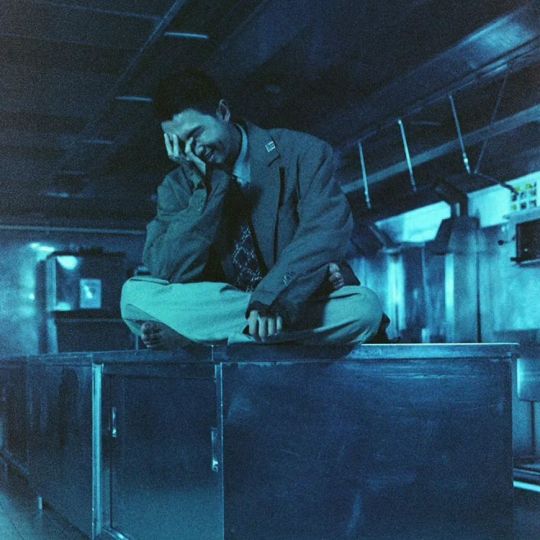
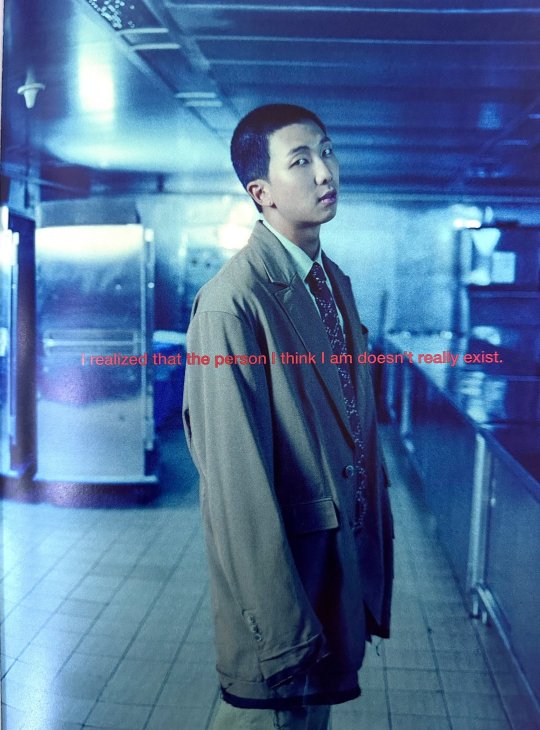
F.B: Come ti approcci e gestisci il tuo status di superstar?
RM: Mi sono messo per tempo a studiare la metacognizione. Cerco di intercettare e decifrare i messaggi e simboli che mi si presentano. Ho imparato a destreggiarmi tra lo stress dell'essere sempre sotto i riflettori ed i lati positivi di tutta questa fama. L'altro giorno, mi è capitato di imbattermi in un post riguardo “Le 4 buone abitudini per essere felici”, su Instagram. Solitamente, detesto quel tipo di contenuti auto-motivazionali. Ma poi mi sono reso conto che io stesso sono già solito dire/pensare tutte e 4 le frasi positive lì menzionate. Forse allora sono felice.
Inoltre, cerco di tagliare fuori il più possibile, e penso d'essere migliorato in questa pratica. Ma la cosa più difficile da gestire è l'atmosfera che si vive e respira nell'industria K-pop. Mi spiace ammetterlo, è piuttosto triste, ma si fa molta attenzione alle apparenze e la gente è sempre concentrata su ciò che fai. Molte persone vedono solo ciò che vogliono vedere. Ma ormai sono in questo settore da 10-11 anni, e credo sia la giusta direzione – la stessa di tuttə coloro che, come me, hanno una certa influenza e decidono di sfruttarla per essere più apertə, onestə. Credo l'onestà, oggigiorno, sia da encomiare.
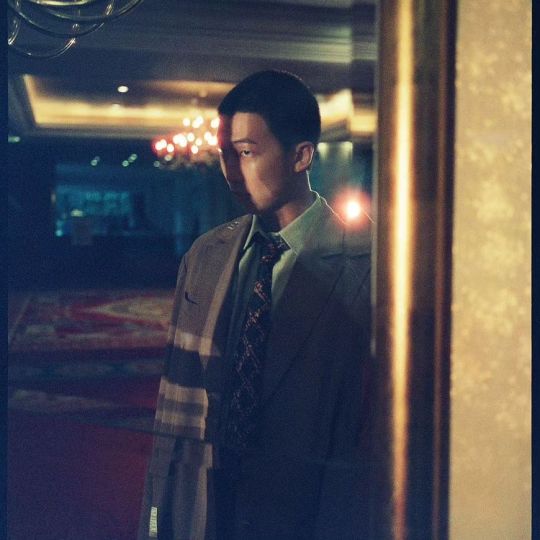
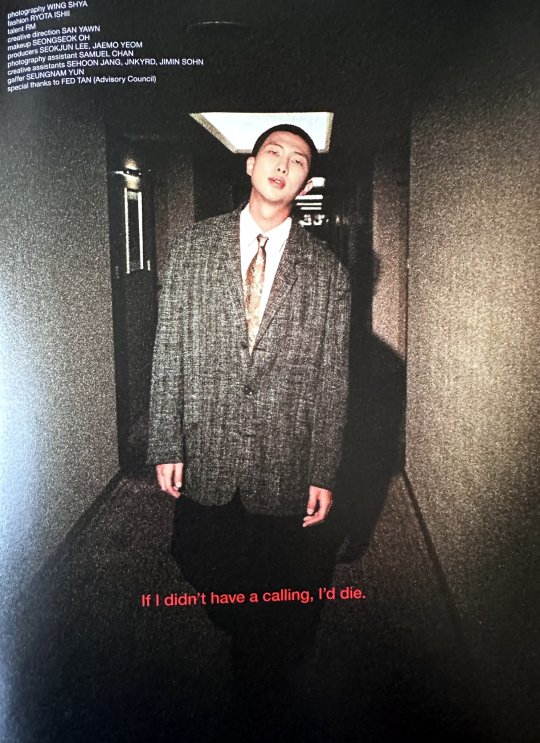
F.B: In che modo ti stai svelando, ora?
RM: Il modo migliore, ovviamente, è attraverso un album o altri contenuti. Cerco anche di condividere molto della mia vita su Instagram. In un certo senso, mi rendo vulnerabile. Vengo anche criticato perché certe persone pensano un idol non dovrebbe mostrare così tanto di sé. Ma questo è il mio modo di dire "vi voglio bene". Cioè, per quanto credete io possa ancora tenere la bocca chiusa e parlare solo delle cose positive, nelle interviste? Quando non si fa che accumulare e tenere tutto chiuso, pressato dentro, alla fine non si può che esplodere. Con questo non voglio dire che gli ultimi 10 anni siano stati una menzogna. Semplicemente, la mia vita è stata talmente intensa da non avere neppure il tempo materiale di pensare ad altro, se non all'impegno o progetto successivo.
F.B: Credo che liberandosi dalle norme sociali coreane, opprimentemente tradizionaliste, moltə artistə abbiano ora abbracciato uno stile di vita più deciso e coraggioso, che è particolarmente vicino a moltə giovani, in tutto il mondo, impegnatə ad opporsi al sistema.
RM: Sono sicuro sia così per diversə artistə, ma non direi sia necessariamente il mio caso. Cioè, non ho mai pensato “Devo parlare di libertà e amore attraverso il mio hip-hop perché la vita è dura” o “Che forza lo spirito d'opposizione dell'hip-hop!”. No. Semplicemente, l'ho sempre trovato bello e divertente.

F.B: Mi piacerebbe parlare un po' con te dell'ascesa della cultura coreana contemporanea, dato che sei l'apogeo della cultura pop di questa nazione. Intervistando vari/e artistə per il mio libro [Make Brake Remix : The Rise of K-style (2022)], sono giunta alla conclusione che la popolarità della cultura coreana a livello globale sia anche merito della sicurezza e spirito di iniziativa con cui questə giovani coreani si sono lanciatə come pionierə con la loro musica, remixando di tutto e di più, con zero inibizioni. Credi esista un approccio o modo di fare caratteristico, qui in Corea, e che sia quello ad aver portato la cultura coreana ad essere così famosa?
RM: L'unico frangente della cultura coreana su cui posso effettivamente esprimermi credo sia quello musicale. Non posso farmi portavoce per altri aspetti della nostra cultura.
Credo ci siano tanti pregiudizi sul nostro conto, come l'idea che i coreani siano stacanovisti all'eccesso. Non dovremmo guardare alle culture straniere attraverso il nostro personale metro di giudizio. Sarebbe bello potessimo guardare le persone, i paesi e le varie culture senza alcun pregiudizio, a mente trasparente.
F.B: Ma la gente sembra essere curiosa di capire se c'è effettivamente un qualche tratto o una caratteristica della cultura coreana che le permette di esercitare una tale fascinazione a livello globale. Tu che ne pensi, credi esista qualcosa del genere?
RM: È tanto che mi trovo nell'occhio di questo ciclone [del K-pop, della cultura coreana e del loro successo], e credo di aver fatto più interviste come questa di chiunque altro. La risposta che mi viene più spontanea è “Non lo so e se non lo so io, immagino nessun altro lo sappia”. Se lo sapessi, credo sarebbe un po' come cercare di spiegare perché si ama una persona in un dato momento. Sono talmente calato nella nostra cultura che se qualcuno di estraneo al nostro contesto mi chiedesse cosa significa essere coreano, non saprei come spiegarlo. È innegabile che in Corea ci sia una certa atmosfera, però. Abbiamo quel qualcosa, senza dubbio. Ma non è alla portata di tutti, solo di coloro che sono natə e cresciutə qui. Se cercassimo di definire cos'è che ci rende coreani, finiremmo nell'astratto e metafisico.
Ma se effettivamente esiste un modo di fare e porsi tipicamente coreano, credo Seoul sia il luogo dove è più facile farsene un'idea. Vediamo moltissime cose disintegrarsi e riassemblarsi costantemente, e questo processo è estremamente rapido ed intenso. I coreani sono velocissimi nell'assorbire, digerire e fare proprie le cose. È ciò che mi piace chiamare dinamismo. Ma come hanno detto anche alcunə artistə nel suo libro, Seoul può diventare troppo intensa, alle volte, e soffocante. Talvolta, è troppo anche per me e mi sembra la città mi consumi. Ci sono persone che non ce la fanno e vorrebbero scappare. Ma se si tiene duro, c'è così tanto che questa città così dinamica può tirar fuori dalle persone.
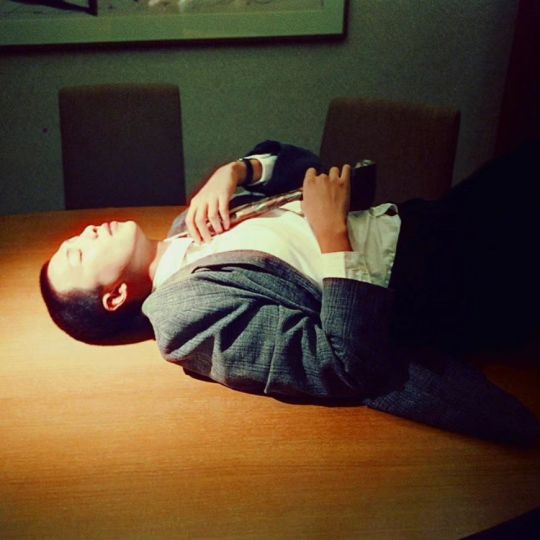
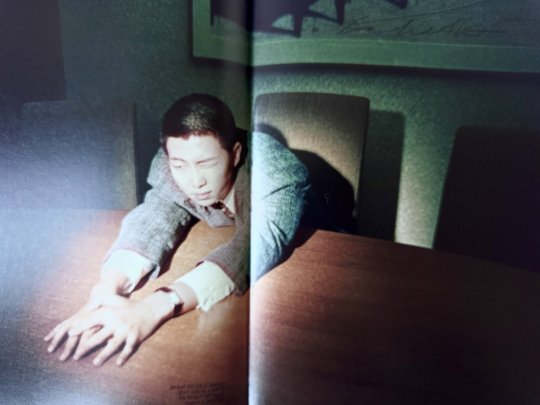
F.B: Che effetto ha avuto su di te l'essere cresciuto qui in Corea?
RM: Io sono cresciuto in una cittadina relativamente nuova, vicino a Seoul, Ilsan. Dopo tutto il tempo trascorso all'estero, però, ho realizzato che ciò che mi permette di stare a galla sono le mie origini coreane. La nostra infanzia non ci abbandona mai. O si finisce per emularla o si prende la direzione opposta, cercando di distanziarsene. La mia infanzia è stata piuttosto felice. Ho ricevuto tantissimo amore e alcuni dei miei migliori amici sono persone conosciute in quel periodo. L'affetto, la nostalgia ed il senso di attaccamento che nutro per la Corea è qualcosa di essenziale, per me. Il K-Pop è estremamente intenso e dinamico, perché unisce la K (Corea) ed il Pop. E la gente sembra rispondere bene a quest'acceleratore quantico, a quell'energia e fusione. In tutto ciò, io mi sento come un salmone che risale la corrente in senso inverso. È l'unico modo per sopravvivere in questo mondo K-Pop senza impazzire.
F.B: Che cosa ne pensi di quella etichetta, della 'K'? Personalmente, trovo che il governo ed i media coreani ne siano piuttosto ossessionati, perché estremamente fieri di ciò che la nostra piccola nazione – schiacciata tra il Giappone e la Cina – è riuscita ad ottenere.
RM: È un'etichetta che arriva principalmente dall'esterno. Per comprendere ciò con cui siamo poco familiari, cerchiamo di trovare definizioni in cui inquadrare la cosa. È un istinto naturale per il genere umano. Alla gente piace pensare ci sia un qualcosa in questo paese che stia portando alla crescita della nostra e di altre culture simili. Però non ho nulla contro quest'etichetta. Anzi, sono molto grato che si stia cercando di dare un nome a ciò che è coreano. Ma capisco anche che moltə creativə non apprezzino essere categorizzatə così. Penso stia ad ogni singolə artista trovare la propria identità. Ma questo processo di individualizzazione e possibile solo grazie a quella 'K'.
F.B: Il K-Pop unisce tanti generi differenti. Credi abbia sviluppato una sua espressività ed un significante sonoro?
RM: Sì, senza dubbio. Ha sviluppato un'identità sonora piuttosto corposa, e molti paesi stanno cercando di copiarla. Io non sono entrato nei BTS perché volevo fare K-Pop. Inizialmente, i BTS erano un gruppo fondamentalmente hip-hop, come i Run-DMC o i Beastie Boys, e poi ci siamo evoluti in ciò che vedete ora. Mi piacerebbe la gente imparasse a considerare il K-Pop nelle sue tante sfaccettature, nella sua tridimensionalità. Innanzitutto, si tratta fondamentalmente di musica ballabile. Ma il K-Pop non è solo musica, è anche coreografia, video musicali e tanti altri contenuti ad esso collegati. È un pacchetto completo. Ho visto molte persone che disprezzavano il K-Pop, diventare fan dopo averne approfondito la conoscenza. Ciò che vorrei dire alla gente è “Non denigrate il K-Pop, prima di averlo provato”.
F.B: E cosa mi puoi dire delle sotto-culture? Che influenza hanno su di te? Mentre lavoravo al mio libro, mi ha intrigato molto scoprire che la scena underground è strettamente legata a quella K-Pop e alla moda coreana mainstream.
RM: Personalmente, sono sempre circondato da queste sotto-culture e ne sono un grandissimo fan. Sebbene la mia immagine di idol sia estremamente curata, molto più spesso sono attratto da tutto ciò che è grezzo e parossistico.
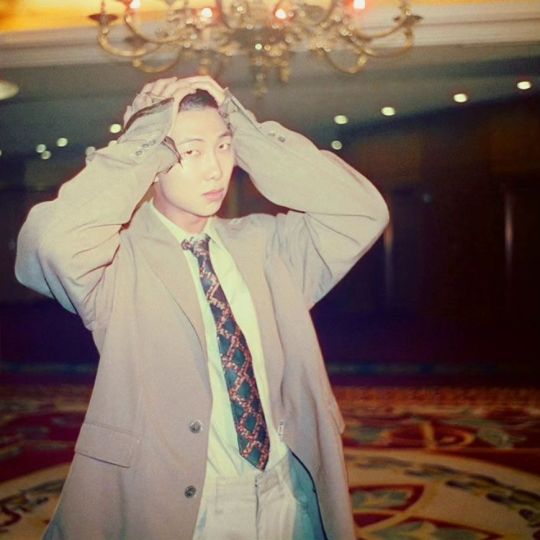
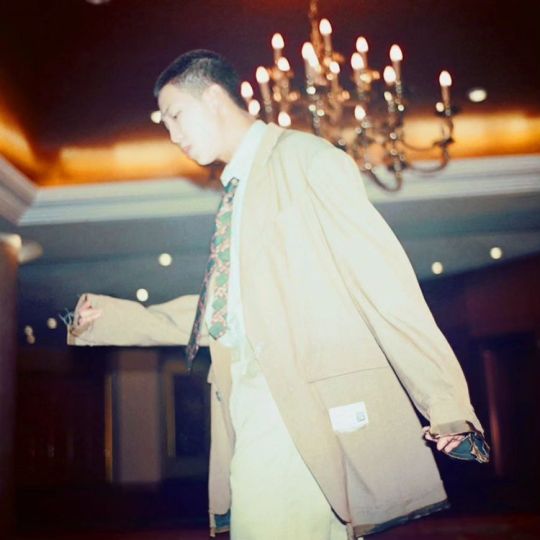
F.B: E cosa ne pensi della moda in genere? Bottega Veneta ha saputo riconoscere il tuo impatto a livello culturale e ti ha nominato suo unico ambasciatore a livello globale.
RM: L'idea di diventare ambassador per marchi di lusso, inizialmente, non mi entusiasmava più di tanto. Ma il direttore creativo di Bottega, Matthieu Blazy, mi ha spiegato che gli piacciono i contenuti di stile ed arte che condivido sul mio profilo Instagram. Semplicemente, mi ha detto “Cerchiamo di conoscerci meglio e parliamo di questi tuoi interessi”. Mi è piaciuto il suo approccio, l'ho trovato intrigante e alla fine ho accettato.
La moda è uno dei contenuti più seducenti nella mia vita. Quando ho iniziato a fare musica, ne ero piuttosto ossessionato, e mi piace tutt'ora. Ho attraversato diverse fasi stilistiche, come quando indossavo streetwear, abiti gothic, quando vestivo Rick Owens o Damir Doma. Pensavo fosse fighissimo vestirmi all black. Poi, però, ho pensato mancasse un po' di colore, proprio come è successo nel passaggio dal mio album Mono (2018) ad Indigo (2022). Grazie al mio lavoro, sono sempre sotto i riflettori. C'è questa cosa chiamata airport fashion [*stile da aeroporto]. La gente si aspetta che io indossi sempre qualcosa di nuovo e diverso, quindi volevo trovare qualcosa che non avesse età. Tipo, qualcosa del 2015 che potessi indossare anche nel 2023. Cercavo qualcosa di classico e comodo che non fosse ancora uscito di moda, e ho trovato l'American Casual. Questo era circa 6 anni. Ora mi piacerebbe provare qualcosa di un goccio più kitsch, più stravagante, insolito e bizzarro, perché trovo che la moda sia come lo stato su KakaoTalk [*l'equivalente coreano di Whatsapp]. È il modo più 스근 [*seu-geun: naturale, sottile, non forzato] di esprimere me stesso e come mi sento in un dato giorno. È davvero uno dei modi più indiretti ma attivi per esprimere la mia personalità.
F.B: Ti piacerebbe creare un tuo brand di moda?
RM: Beh, la moda non mi ispira tanto quanto fa l'arte, da quando mi ci sono appassionato.
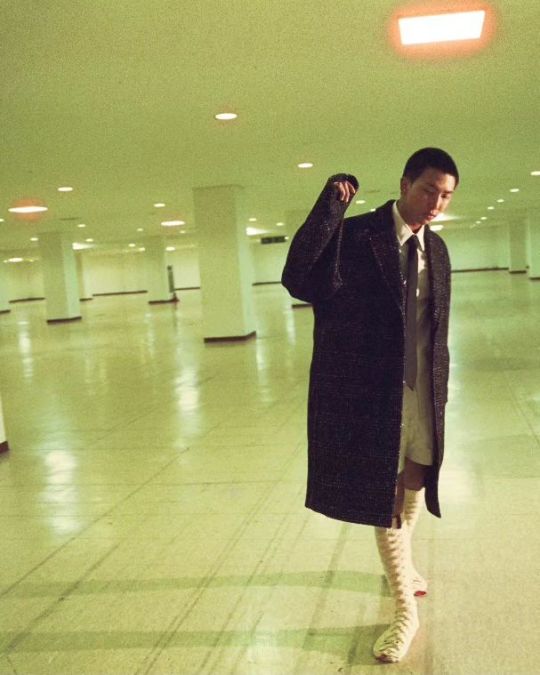
F.B: L'arrivo di Frieze Seoul, l'anno scorso, ha elevato il prestigio della Corea, dimostrando che non sono solo il K-Pop o i K-drama, ma anche la scena artistica coreana ad attrarre l'attenzione globale. E la tua visita alla fiera ha generato più entusiasmo di quanto avrebbe potuto fare la stampa da sola. So che hai iniziato a collezionare opere d'arte fin dal 2018, ma sono rimasta comunque molto colpita quando [*il gallerista] Thaddaeus Ropac mi ha detto quanta influenza hai tra i/le giovani collezionistə. Dice che moltə giovani collezionistə coreanə come te hanno abbracciato la causa artistica, spendendo conoscenze e passione a beneficio di una vasta gamma di artistə appartenenti ai periodi più disparati. E ha anche detto che non aveva mai visto nulla del genere in altri paesi.
Perché collezioni opere d'arte?
RM:Durante i nostri tour mondiali, ho sviluppato una certa passione per i musei e le opere pittoriche che avevo studiato a scuola. Ma poi ho avuto questa realizzazione: certo, conoscevo Monet e Van Gogh, ma non sapevo nulla degli artisti coreani. Ora amo particolarmente l'arte coreana moderna e contemporanea. Questi artisti erano impegnati a spremere vernice sulle loro tavolozze persino durante l'occupazione giapponese e la guerra di Corea. Mi conforta sapere che le difficoltà e le prove che devo affrontare nella mia vita non sono nulla, rispetto a ciò che hanno vissuto loro. Per loro era questione di vita o di morte.
Ma credo la gente, in un certo senso, abbia una concezione sbagliata di me. Ad esempio, non mi piacciono proprio tutti gli artisti della Dansackhwa [la corrente pittorica monocromatica nata in Corea negli anni '50, nel tentativo di accettare ed incorporare le influenze del modernismo occidentale nella cultura coreana]. Yun Hyong-keun è l'unico che ammiro effettivamente. E non credo sia possibile trovare legami concreti e farli ricadere tutti in una stessa categoria. In un certo senso, la Dansackhwa è un po' come l'etichetta 'K' o il K-Pop.
Sono andato a trovare moltə dei/lle galleristə storici/che e le famiglie degli artisti per capire ed imparare di più. Rispetto il fatto che questi artisti fossero buoni compagni d'arme, tra loro, a dispetto delle differenze che potevano esserci e nonostante fosse considerato ridicolo che dei coreani si dedicassero all'arte astratta d'impronta occidentale, ma ci sono anche stati molti contrasti all'interno della loro cerchia.
F.B: Ho saputo da un/'altrə collezionista che recentemente hai iniziato ad interessarti anche all'arte coreana antica. Come mai?
RM: Mi incuriosiva scoprire quali fossero le influenze degli artisti che ammiro, quindi mi è venuto naturale spostare la mia attenzione sull'arte antica. Il modo più semplice per imparare a conoscere l'arte antica, è spendervi soldi, continuare ad osservarla e toccarla, cercando di capirne la struttura e la forma. Preso dalla cosa, mi è capitato anche di comprare un falso. O almeno credo, me l'hanno detto dei professori e studiosi – che sono ben più esperti del sottoscritto, in questo – Ma anche se è un falso, non importa. Fa sempre parte di questo processo di conoscenza, io pago per imparare. Ormai sono dentro, non posso tirarmi indietro.
Toccando con mano questi oggetti ossidati, queste opere che hanno visto giorni migliori, mi sembra quasi che un po' della loro anima entri a far parte di me.
I pittori più famosi dell'epoca Joseon [1392 – 1897], come Gyeomjae, Danwon, Chusa e Neunghokwan, hanno avuto vite e traiettorie esperienziali piuttosto diverse tra loro. Alcuni erano pittori di corte, altri sono diventati ritrattisti per l'aristocrazia e altri ancora hanno rinunciato a tutto e si sono trasferiti in campagna dove cercavano di dar forma ai loro pensieri, dipingendo pini. Trovo tutto questo così affascinante.. perché sembra quasi ciò che ho di fronte sia la risposta a come dovrei vivere io in quanto artista.
F.B: Cosa puoi dirci del nuovo progetto cui stai lavorando?
RM: Sostanzialmente, ho preso la direzione opposta rispetto ad Indigo. Ma non è solo leggero e divertente. La gente mi vede e pensa che io sia una persona molto seriosa, dolce e garbata, ma non sono solo quello. Ho anche molti lati decisamente meno seri. Mi piace molto far ridere la gente.
⠸ Ita : © Seoul_ItalyBTS | Scan Eng : © jungkkyu ; © loopsofnj
#Seoul_ItalyBTS#TradITA#ITA#Traduzione#Intervista#BTS#방탄소년단#RM#김남준#032c#BottegaVeneta#Arte#Musica#RMx032C#RMxBottegaVeneta#241123
0 notes
Text
GOOD MUSIC FROM A SHIT YEAR (2020)
Duma - Duma
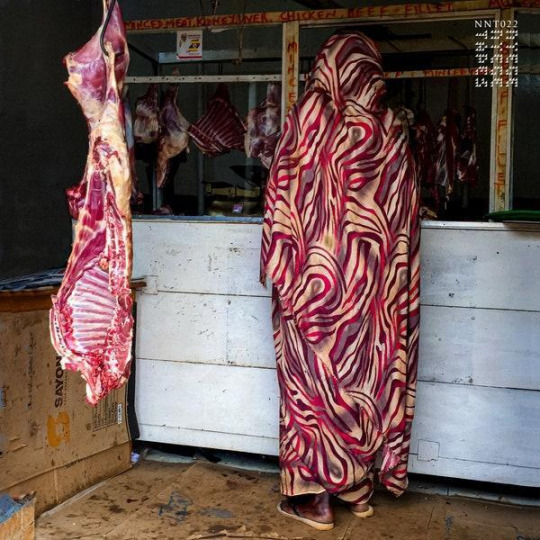
Wretched! Nairobi's grind mutants crash the club with nothing but bad intentions. This is music for nobody else but the creatures underneath the floorboards and in between the walls.
Duma - ‘Lionsblood’
Dreamcrusher - Panopticon!
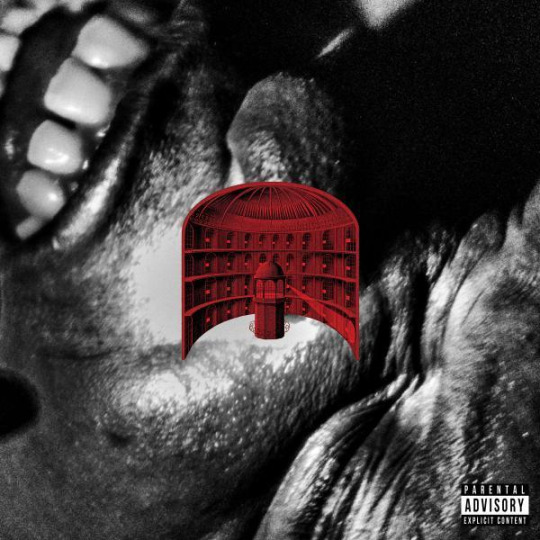
The blues are alive! Dreamcrusher is the master composer of this world's heaviest lamentations. There's been a breakdown in the bomb shelter - long live Nihilist Queer Revolt Musik!
Dreamcrusher - ‘Two’ Phoebe Bridgers - Punisher

The end is here, and singer-songwriters with acoustic guitars are singing our eulogies. Even the ghosts themselves will feel haunted by the endless wrestling and entanglement. Big ups to the rebel without a clue.
Phoebe Bridgers - ‘Chinese Satellite’ Westside Gunn - Pray for Paris

Without a doubt, it has been Griselda's year. In this Renaissance era cultivated by the crew, ringleader Westside Gunn is Michelangelo. Heaven, Hell and the mortal world - it's all there in the fresco he's painted on the ceiling of the cathedral.
Westside Gunn - ‘Allah Sent Me’
Oily Boys - Cro Memory Grin
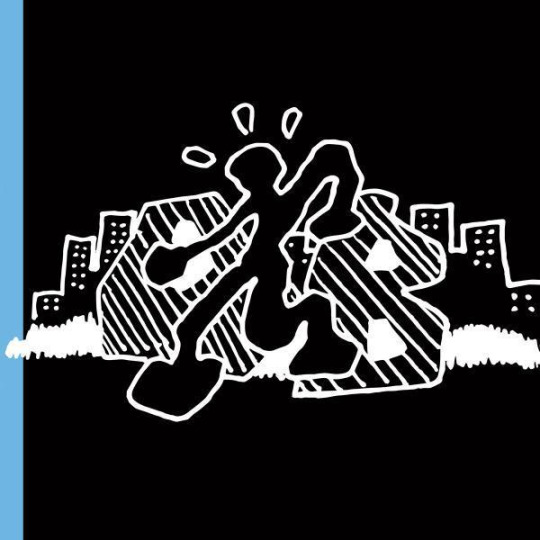
Hail the unholy sound of Sydney slowly collapsing. Shoulder these schizophrenic implosions on struggle street, look past the postcards for what this city really is: poison, grime and ceaseless wanderings.
Oily Boys - ‘Heat Harmony’ Snoee Badman x Utility - #3Badman
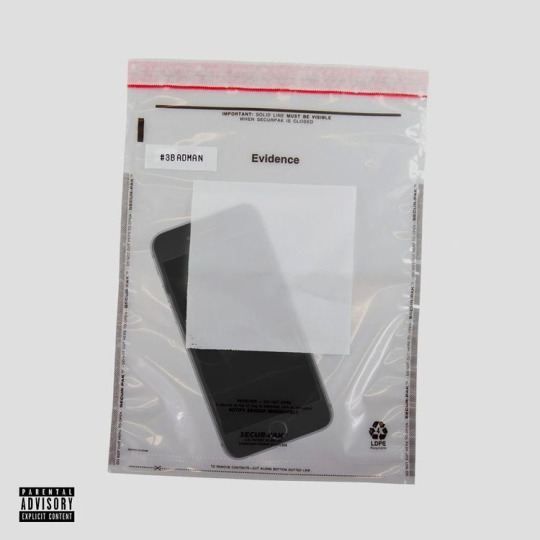
In the year Sydney drill made the global stage, Snoee Badman kept it raw, kept it underground, kept it lethal. The spirit of Tommy Wright III seems to be lingering about Snoee's maxo transmissions. Real.
Snoee Badman x Utility - ‘On the Map’ Moor Mother & billy woods - BRASS

BRASS is PURE HIP-HOP. It has been cooked, burnt, boiled, seared and served in between the chefs' cigarette breaks in the alleyway. Moor Mother (Black Quantum Futurism Collective) and billy woods (Armand Hammer) have just given you your final meal.
Moor Mother & billy woods - ‘The Blues Remembers Everything This Country Forgot’
Hook - I Love You 2, Hook

Hook's a brat, how can you pin her down? She's cutting heads off of dolls and doing DIY chemistry experiments out the back. The newschool's full, so of course she's truant.
Hook - ‘Answer’ 700 Feel - 700 Feel

Have you ever lost yourself on the M4 in the early hours? No company but the streetlights and highway patrol, the voices on the mix you're playing sound a million miles away. Bump this next time you find yourself there.
700 Feel - ‘T1 Western’ Rico Nasty - Nightmare Vacation
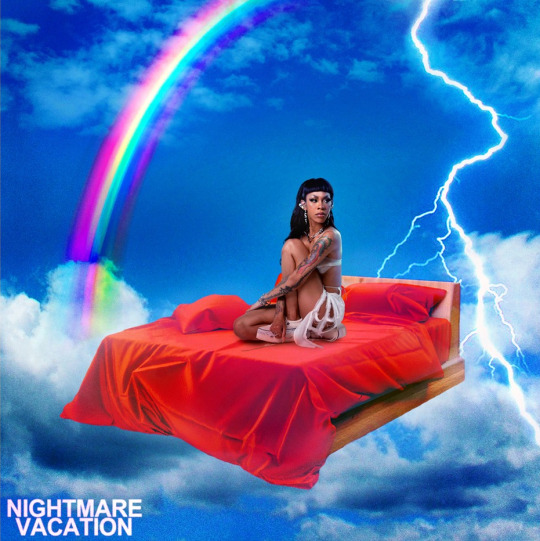
Pop is eating itself! The millennials of the new decade are hungry, and the greedy gnashing of Rico's gilded teeth couldn't sound any sweeter. This one's for the freaks with the cracked iPhone screens.
Rico Nasty - ‘STFU’
#music#reviews#rico nasty#700 feel#dreamcrusher#westside gunn#hook#snoee badman#utility#moor mother#billy boys#oily boys#phoebe bridgers#duma#aoty#2020
30 notes
·
View notes
Text
201220 TIME
ENTERTAINER of the year - BTS
It’s late October, and SUGA is sitting on a couch strumming a guitar. His feet are bare, his long hair falling over his eyes. He noodles around, testing out chords and muttering softly to himself, silver hoop earrings glinting in the light. “I just started learning a few months ago,” he says. It’s an intimate moment, the kind you’d spend with a new crush in a college dorm room while they confess rock-star ambitions. But SUGA is one-seventh of the Korean pop band BTS, which means I’m just one of millions of fans watching, savoring the moment.
BTS isn’t just the biggest K-pop act on the charts. They’ve become the biggest band in the world—full stop. Between releasing multiple albums, breaking every type of record and appearing in these extemporaneous livestreams in 2020, BTS ascended to the zenith of pop stardom. And they did it in a year defined by setbacks, one in which the world hit pause and everyone struggled to maintain their connections. Other celebrities tried to leverage this year’s challenges; most failed. (Remember that star-studded “Imagine” video?) But BTS’s bonds to their international fan base, called ARMY, deepened amid the pandemic, a global racial reckoning and worldwide shutdowns. “There are times when I’m still taken aback by all the unimaginable things that are happening,” SUGA tells TIME later. “But I ask myself, Who’s going to do this, if not us?”

Today, K-pop is a multibillion-dollar business, but for decades the gatekeepers of the music world—the Western radio moguls, media outlets and number-crunchers—treated it as a novelty. BTS hits the expected high notes of traditional K-pop: sharp outfits, crisp choreography and dazzling videos. But they’ve matched that superstar shine with a surprising level of honesty about the hard work that goes into it. BTS meets the demands of Top 40’s authenticity era without sacrificing any of the gloss that’s made K-pop a cultural force. It doesn’t hurt that their songs are irresistible: polished confections that are dense with hooks and sit comfortably on any mainstream playlist.
BTS is not the first Korean act to establish a secure foothold in the West, yet their outsize success today is indicative of a sea change in the inner workings of fandom and how music is consumed. From propelling their label to a $7.5 billion IPO valuation to inspiring fans to match their $1 million donation to Black Lives Matter, BTS is a case study in music-industry dominance through human connection. Once SUGA masters the guitar, there won’t be much left for them to conquer.
In an alternate universe where COVID-19 didn’t exist, BTS’s 2020 would likely have looked much like the years that came before. The group got its start in 2010, after K-pop mastermind and Big Hit Entertainment founder Bang Si-hyuk recruited RM, 26, from Seoul’s underground rap scene. He was soon joined by Jin, 28; SUGA, 27; j-hope, 26; Jimin, 25; V, 24; and Jung Kook, 23, selected for their dancing, rapping and singing talents.
But unlike their peers, BTS had an antiestablishment streak, both in their activism and in the way they contributed to their songwriting and production—which was then rare in K-pop, although that’s started to change. In BTS’s debut 2013 single, “No More Dream,” they critiqued Korean social pressures, like the high expectations placed on schoolkids. They have been open about their own challenges with mental health and spoken publicly about their support for LGBTQ+ rights. (Same-sex marriage is still not legally recognized in South Korea.) And they’ve modeled a form of gentler, more neutral masculinity, whether dyeing their hair pastel shades or draping their arms lovingly over one another. All this has made them unique not just in K-pop but also in the global pop marketplace.
In March, BTS was prepping for a global tour. Instead, they stayed in Seoul to wait out the pandemic. For the group, life didn’t feel too different: “We always spend 30 days a month together, 10 hours a day,” Jin says. But with their plans upended, they had to pivot. In August, BTS dropped an English-language single, “Dynamite,” that topped the charts in the U.S.—a first for an all-Korean act. With their latest album this year, Be, they’ve become the first band in history to debut a song and album at No. 1 on Billboard’s charts in the same week. “We never expected that we would release another album,” says RM. “Life is a trade-off.”

Their triumphs this year weren’t just about the music. In October, they put on perhaps the biggest virtual ticketed show of all time, selling nearly a million tickets to the two-night event. Their management company went public in Korea, turning Bang into a billionaire and each of the members into millionaires, a rarity in an industry where the spoils often go to the distributors, not the creators. And they were finally rewarded with a Grammy nomination. On YouTube, where their Big Hit Labels is one of the top 10 most subscribed music accounts (with over 13 billion views by this year), their only real competition is themselves, says YouTube’s music-trends manager Kevin Meenan. The “Dynamite” video racked up 101 million views in under 24 hours, a first for the platform. “They’ve beaten all their own records,” he says.
Not that the glory comes without drawbacks: namely, lack of free time. It’s nearing midnight in Seoul in late November, and BTS, sans SUGA, who’s recovering from shoulder surgery, are fitting in another interview—this time, just with me. V, Jimin and j-hope spontaneously burst into song as they discuss Jin’s upcoming birthday. “Love, love, love,” they harmonize, making good use of the Beatles’ chorus, turning to their bandmate and crossing their fingers in the Korean version of the heart symbol.
Comparisons to that epoch-defining group are inevitable. “What’s different is that we’re seven, and we also dance,” says V. “It’s kind of like a cliché when big boy bands are coming up: ‘Oh, there’s another Beatles!’” says RM. I’ve interviewed BTS five times, and in every interaction, they are polite to a fault. But by now they must be weary of revisiting these comparisons, just as they must be tired of explaining their success. RM says it’s a mix of luck, timing and mood. “I’m not 100% sure,” he says.
They’ve matured into smart celebrities: focused and cautious, they’re both more ready for the questions and more hesitant to make big statements. When you ask BTS about their landmark year, for once they’re not exactly chipper; j-hope wryly calls it a “roller coaster.” “Sh-t happens,” says RM. “It was a year that we struggled a lot,” says Jimin. Usually a showman, on this point he seems more introspective than usual. “We might look like we’re doing well on the outside with the numbers, but we do go through a hard time ourselves,” he says. For a group whose purpose is truly defined by their fans, the lack of human interaction has been stifling. Still, they’ve made it a point to represent optimism. “I always wanted to become an artist that can provide comfort, relief and positive energy to people,” says j-hope. “That intent harmonized with the sincerity of our group and led us to who we are today.”
In an era marked by so much anguish and cynicism, BTS has stayed true to their message of kindness, connection and self-acceptance. That’s the foundation of their relationship with their fans. South Korean philosopher and author Dr. Jiyoung Lee describes the passion of BTS’s fandom as a phenomenon called “horizontality,” a mutual exchange between artists and their fans. As opposed to top-down instruction from an icon to their followers, BTS has built a true community. “Us and our fans are a great influence on each other,” says j-hope. “We learn through the process of making music and receiving feedback.” The BTS fandom isn’t just about ensuring the band’s primacy—it’s also about extending the band’s message of positivity into the world. “BTS and ARMY are a symbol of change in zeitgeist, not just of generational change,” says Lee.
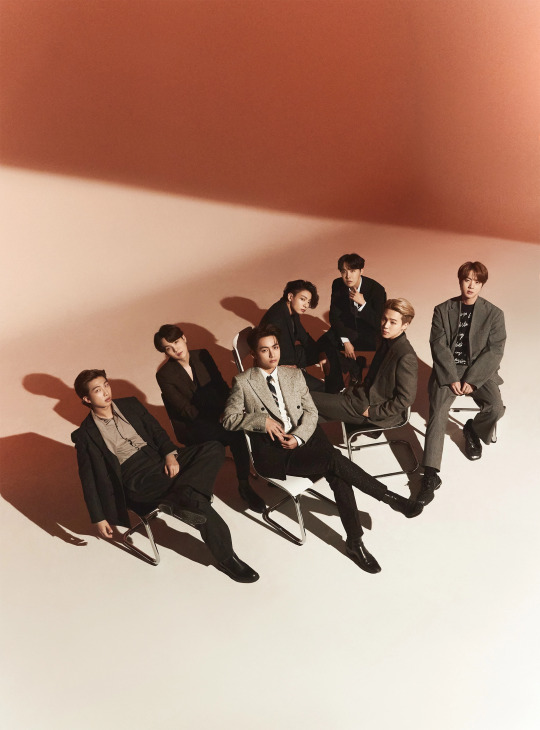
And in June, BTS became a symbol of youth activism worldwide after they donated $1 million to the Black Lives Matter movement amid major protests in the U.S. (They have a long track record of supporting initiatives like UNICEF and school programs.) BTS says now it was simply in support of human rights. “That was not politics. It was related to racism,” Jin says. “We believe everyone deserves to be respected. That’s why we made that decision.”
That proved meaningful for fans like Yassin Adam, 20, an ARMY from Georgia who runs popular BTS social media accounts sharing news and updates, and who is Black. “It will bring more awareness to this issue people like me face in this country,” he says. “I see myself in them, or at least a version of myself.” In May and June, a broad coalition of K-pop fans made headlines for interfering with a police app and buying out tickets for a Trump campaign rally, depleting the in-person attendance. Later that summer, ARMY’s grassroots fundraising effort matched BTS’s $1 million donation to Black Lives Matter within 24 hours.
For 28-year-old Nicole Santero, who is Asian American, their success in the U.S. is also a triumph of representation: “I never really saw people like myself on such a mainstream stage,” Santero says. She’s writing her doctoral dissertation on the culture of BTS fandom, and she runs a popular Twitter account that analyzes and shares BTS data. “Anytime I’m awake, I’m doing something related to BTS,” she says. “This is a deeper kind of love.”
Devotion like that is a point of pride for BTS, particularly in a year when so much has felt uncertain. “We’re not sure if we’ve actually earned respect,” RM says. “But one thing for sure is that [people] feel like, O.K., this is not just some kind of a syndrome, a phenomenon.” He searches for the right words. “These little boys from Korea are doing this.”
Source: TIME
0 notes